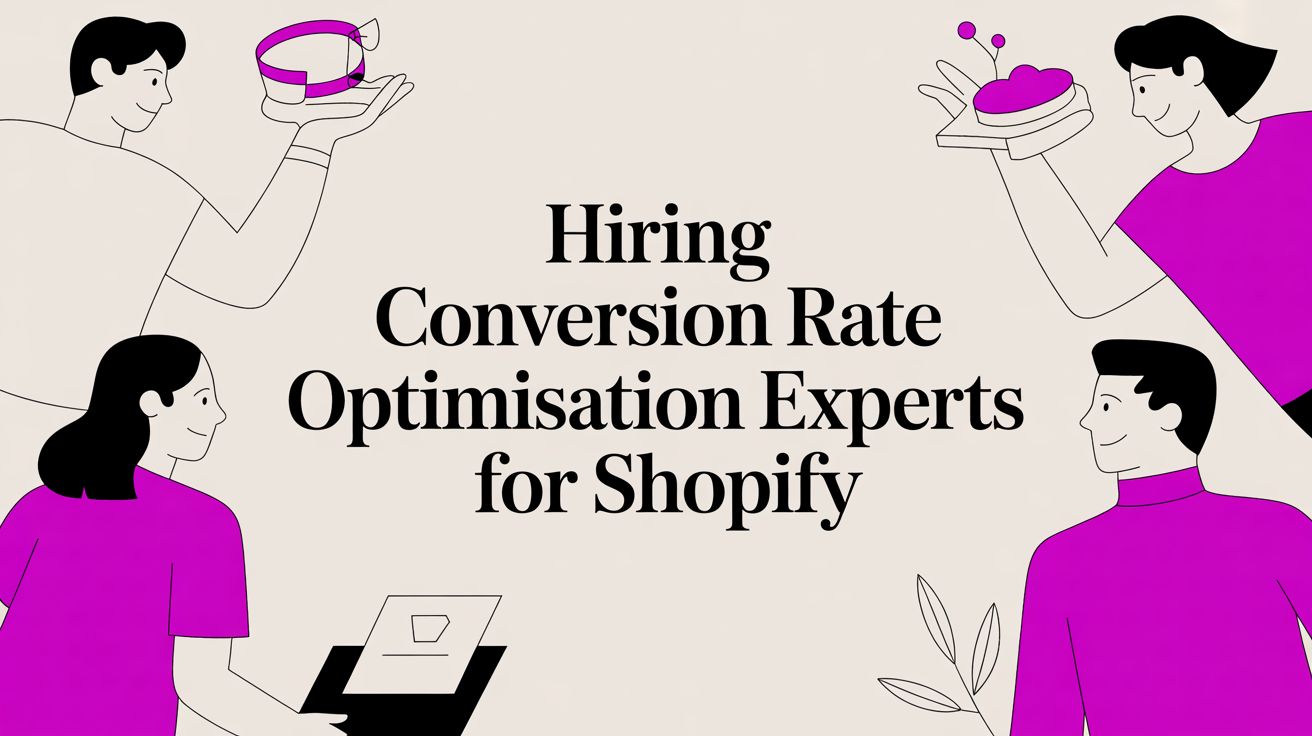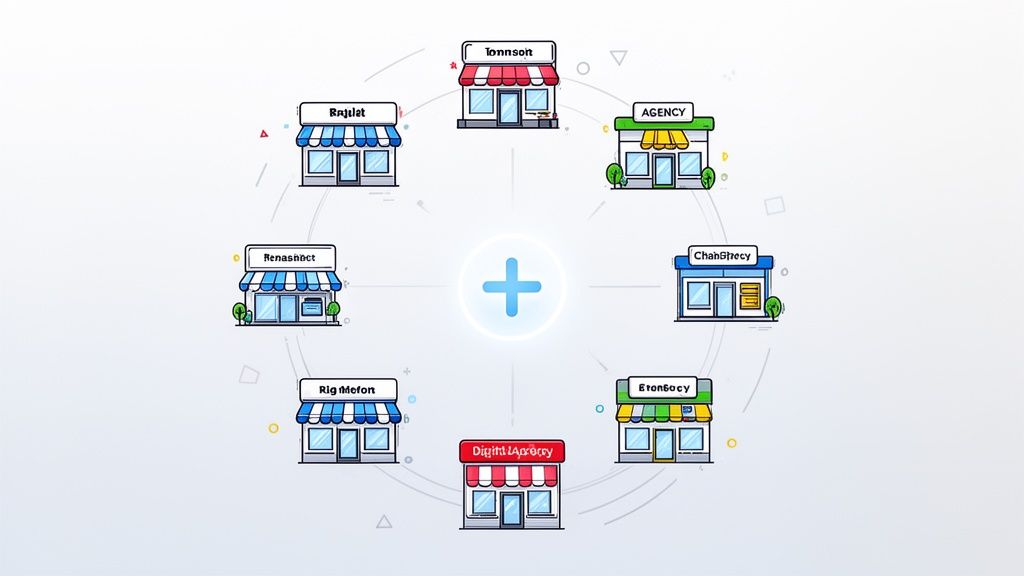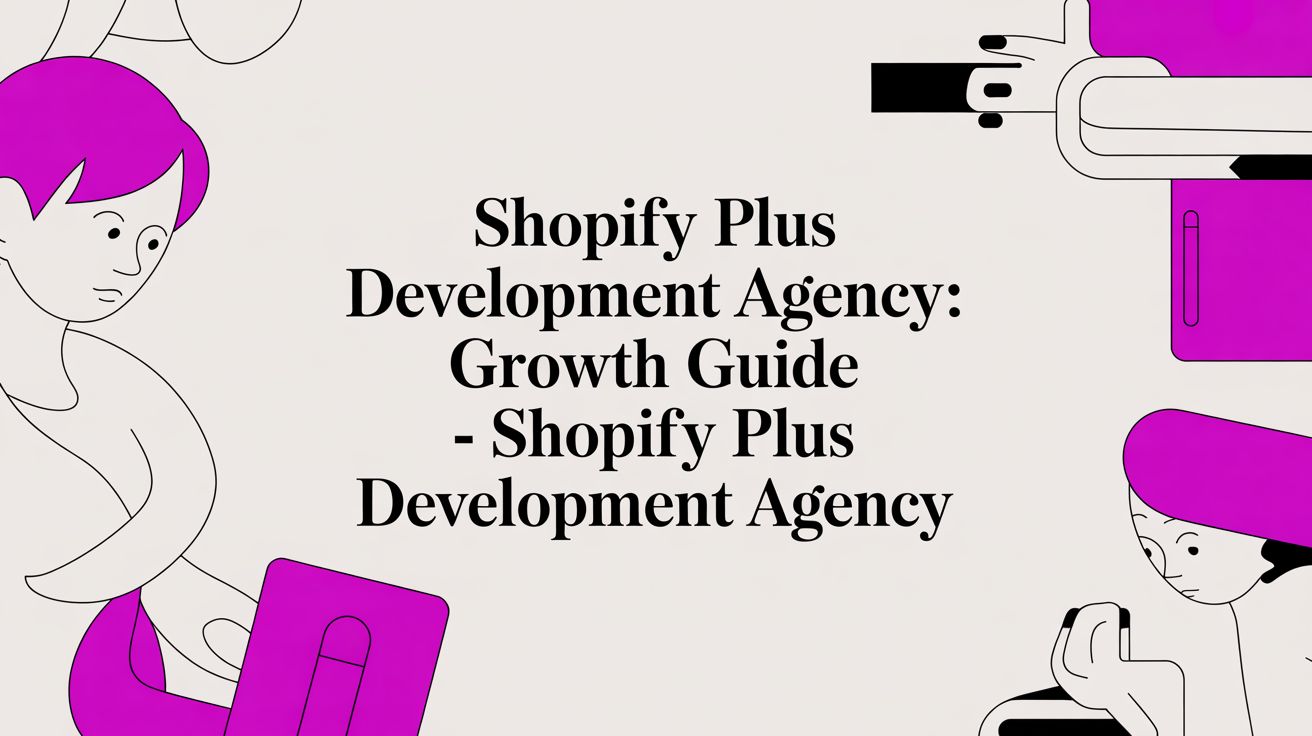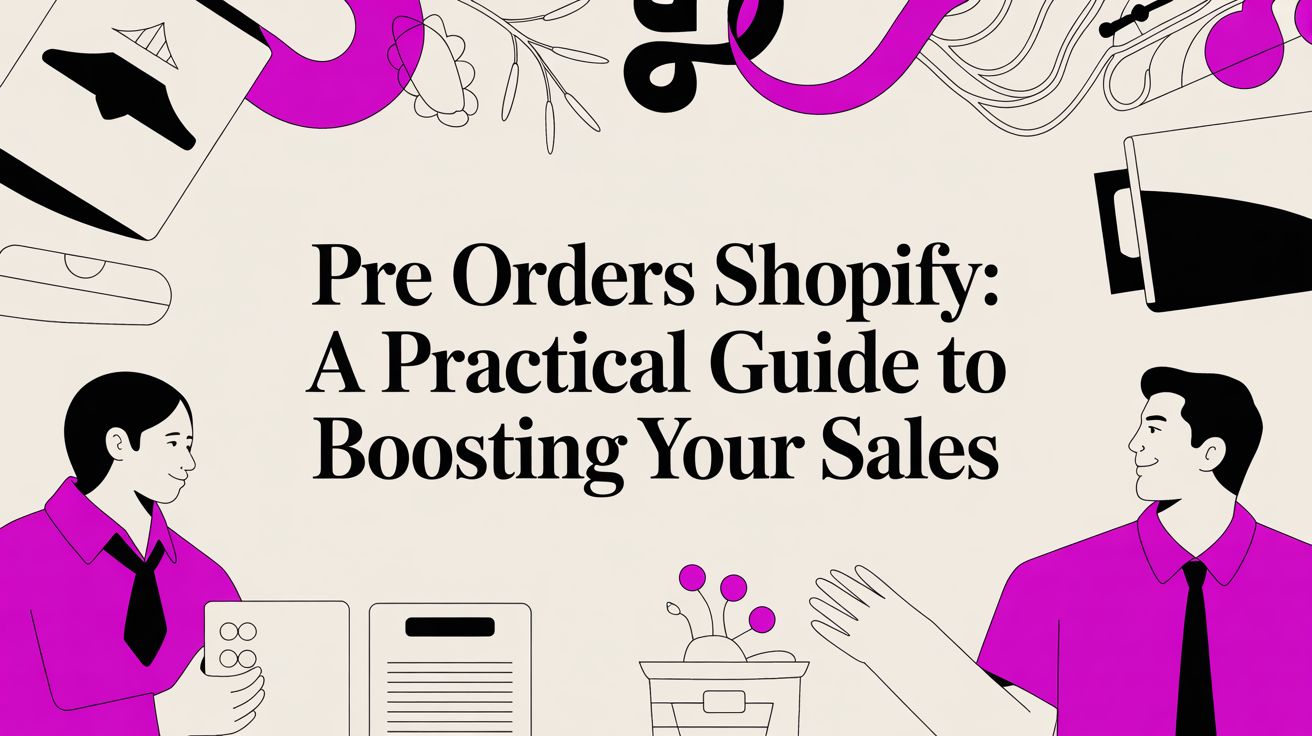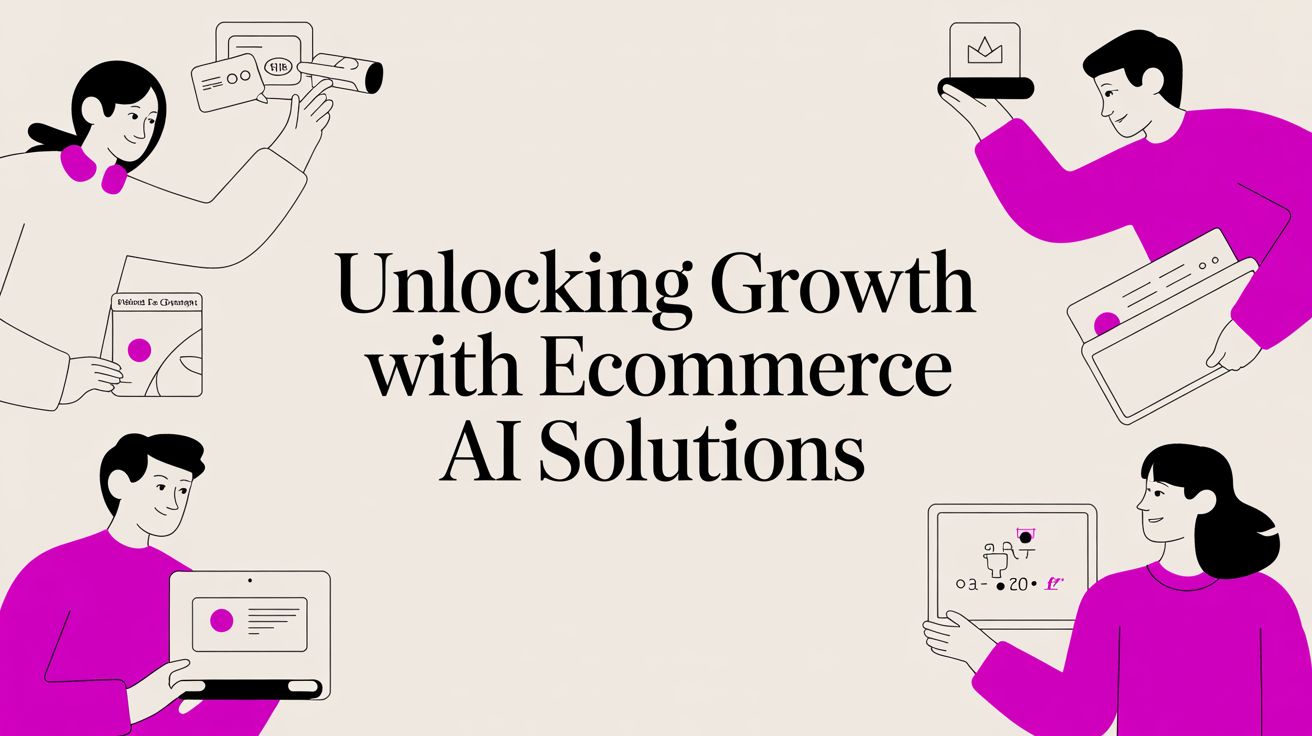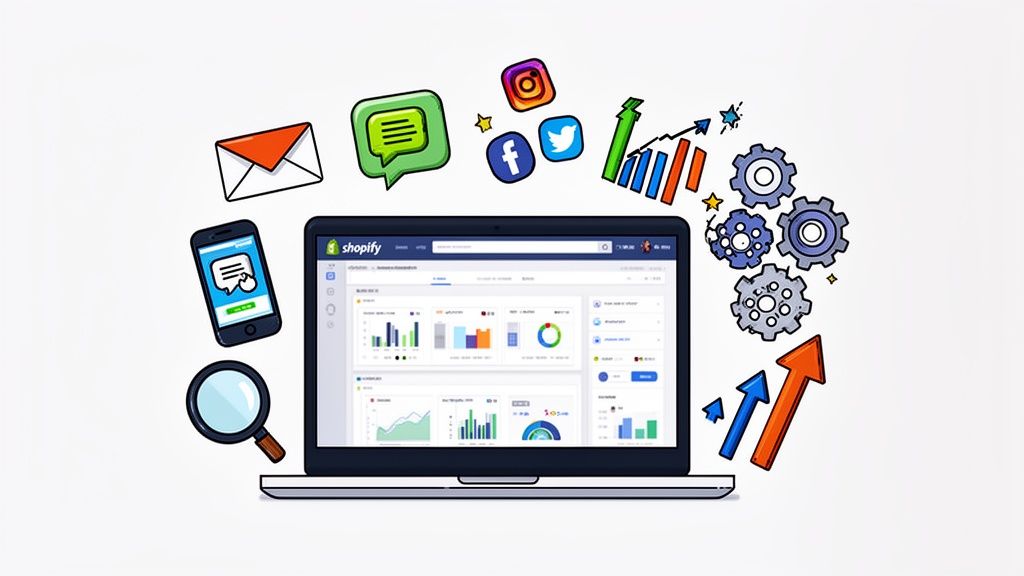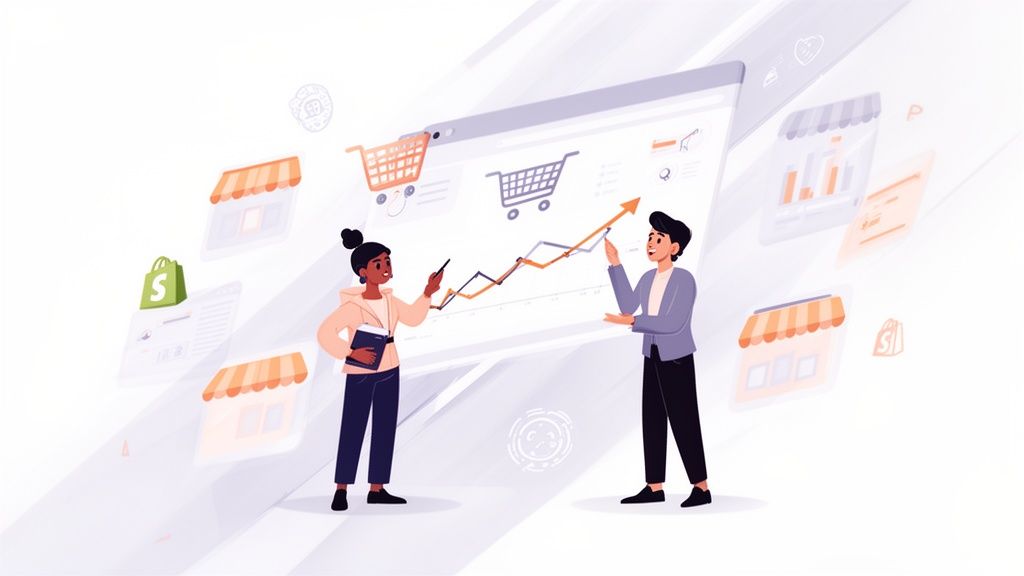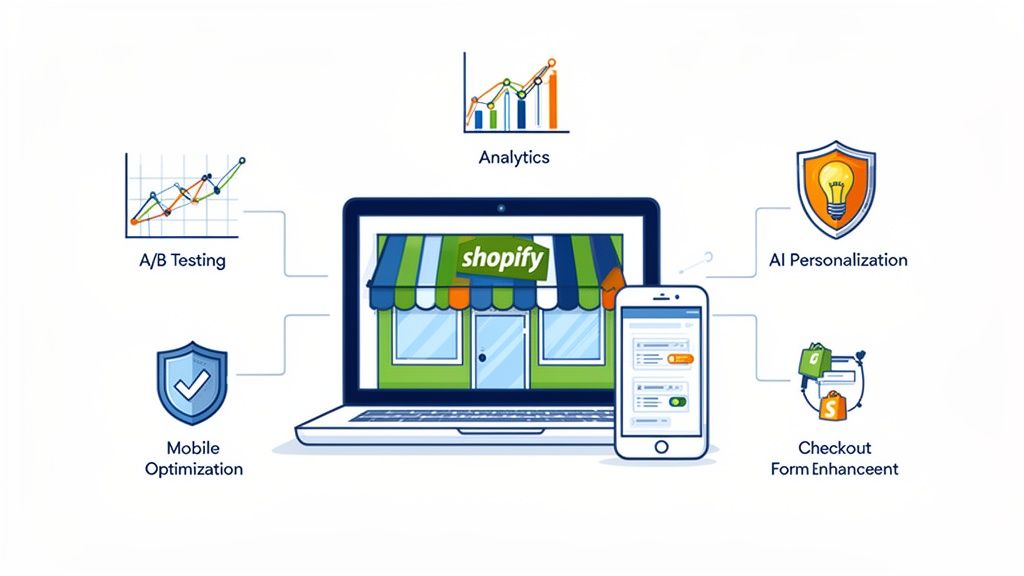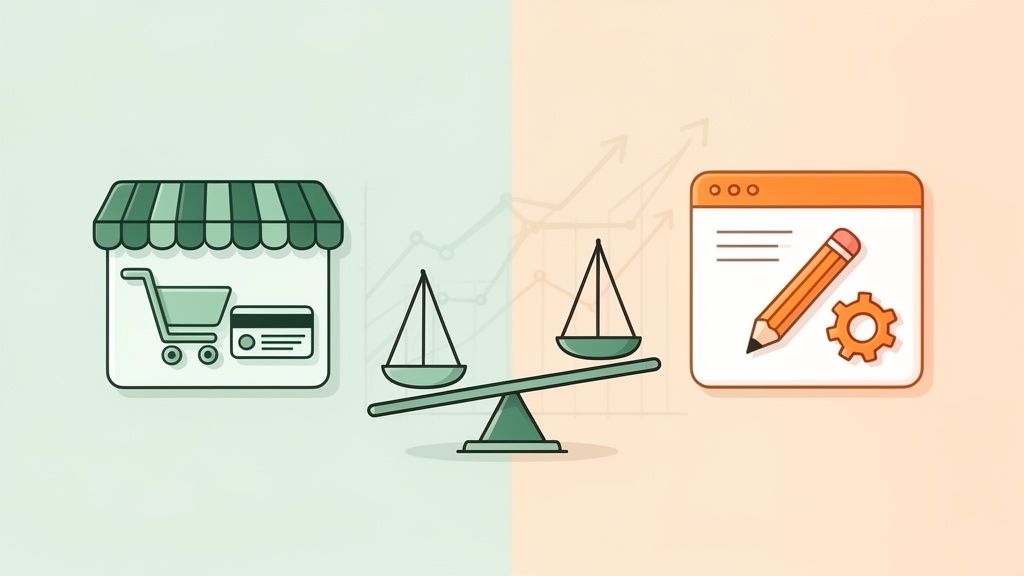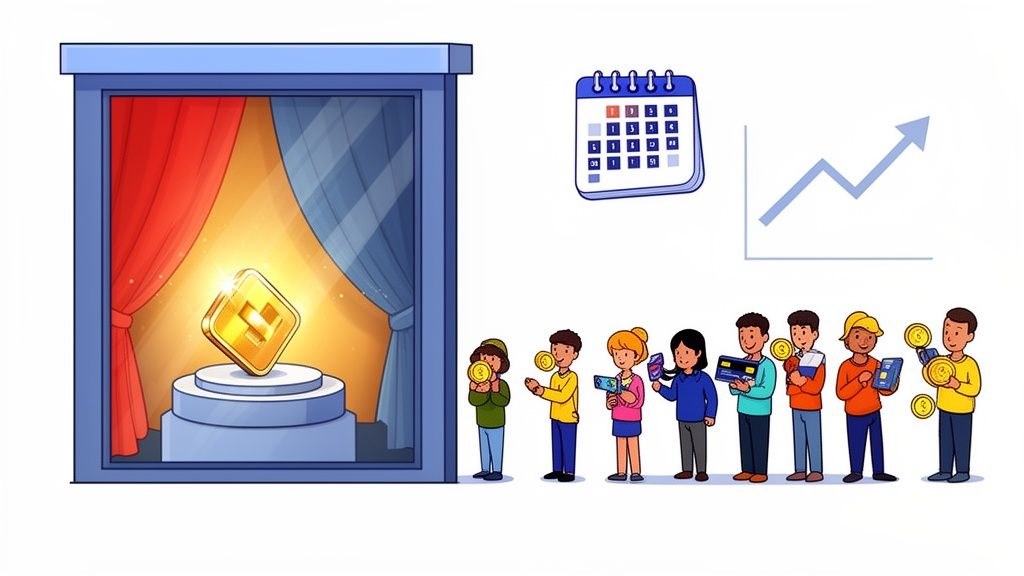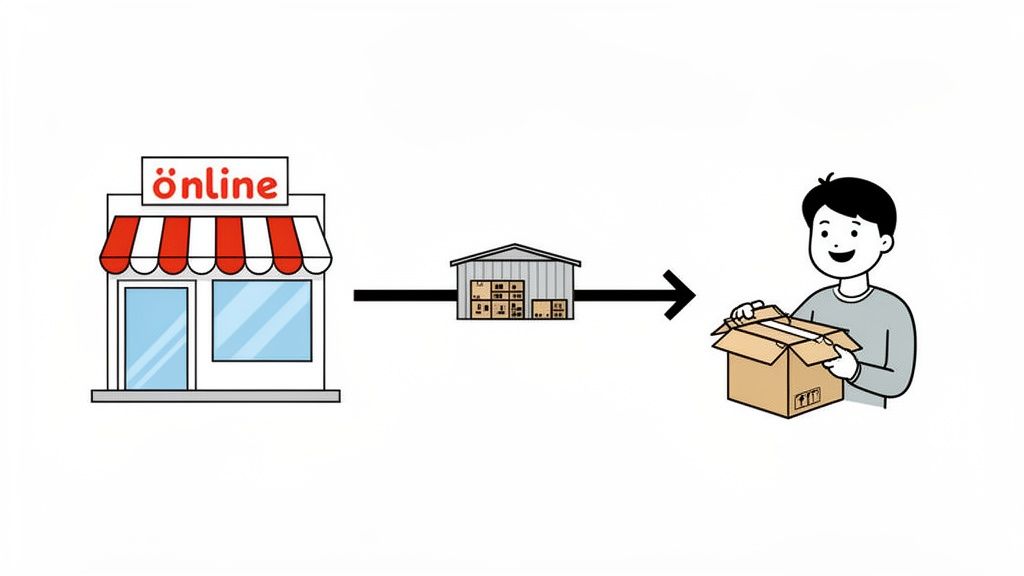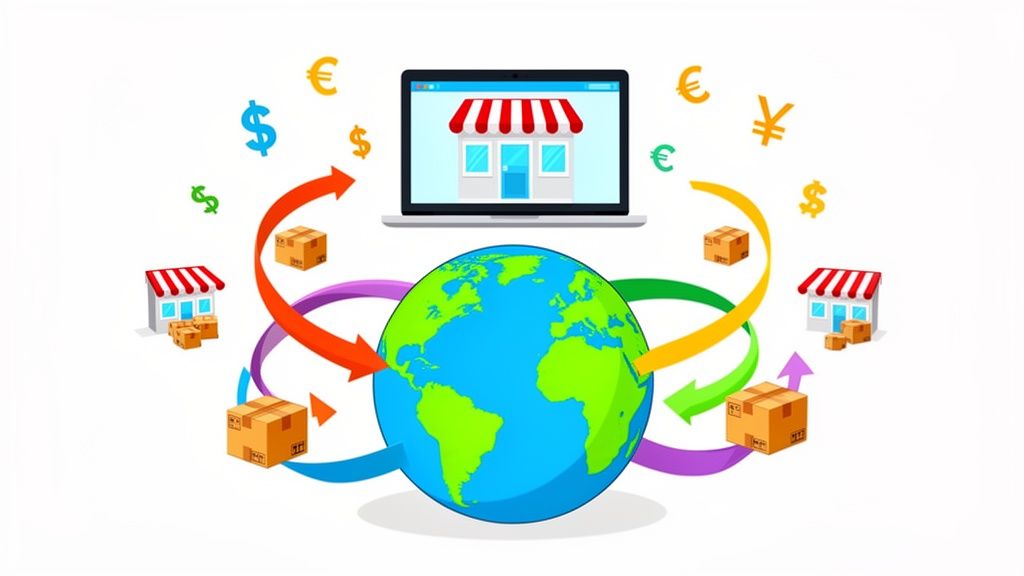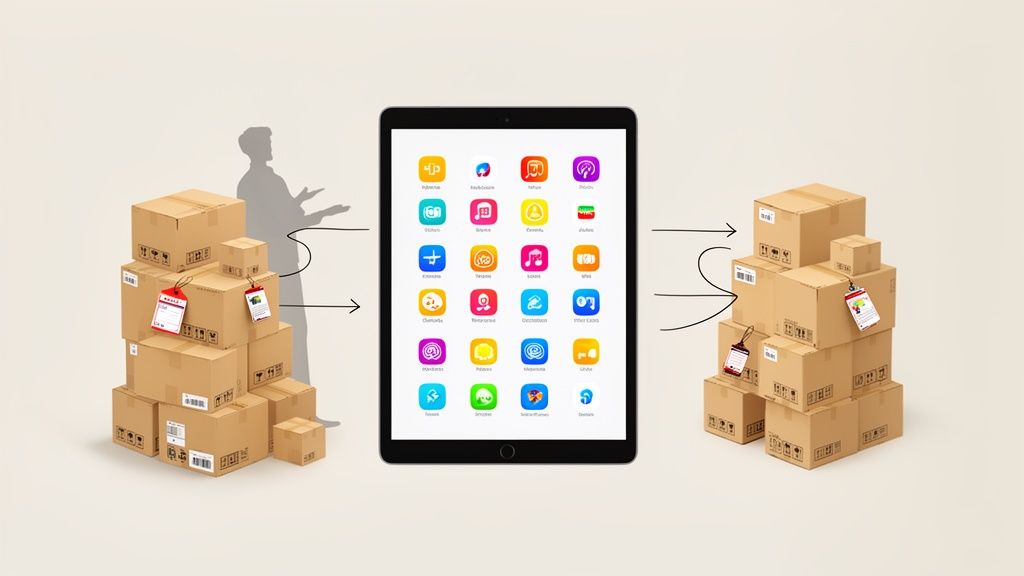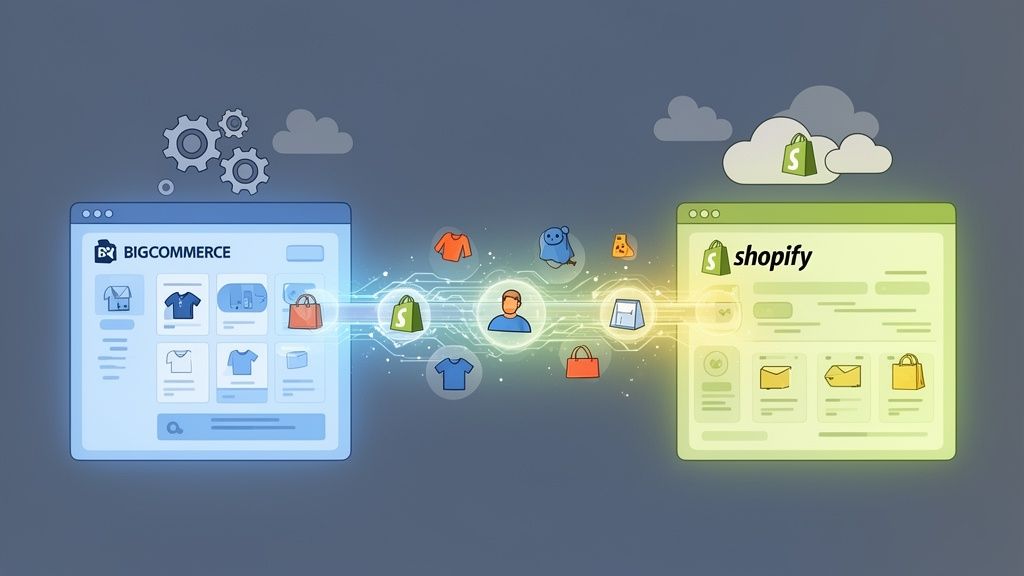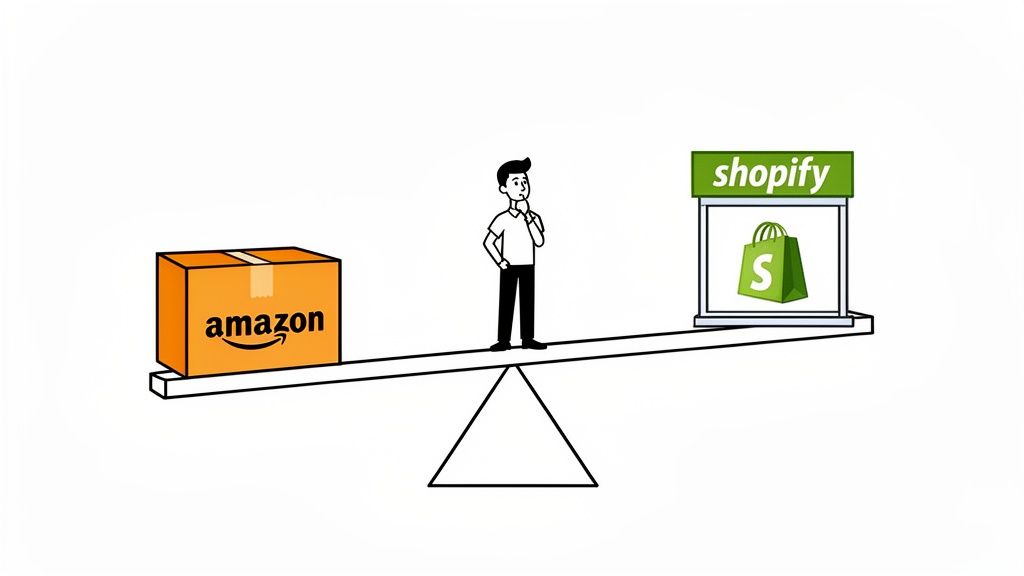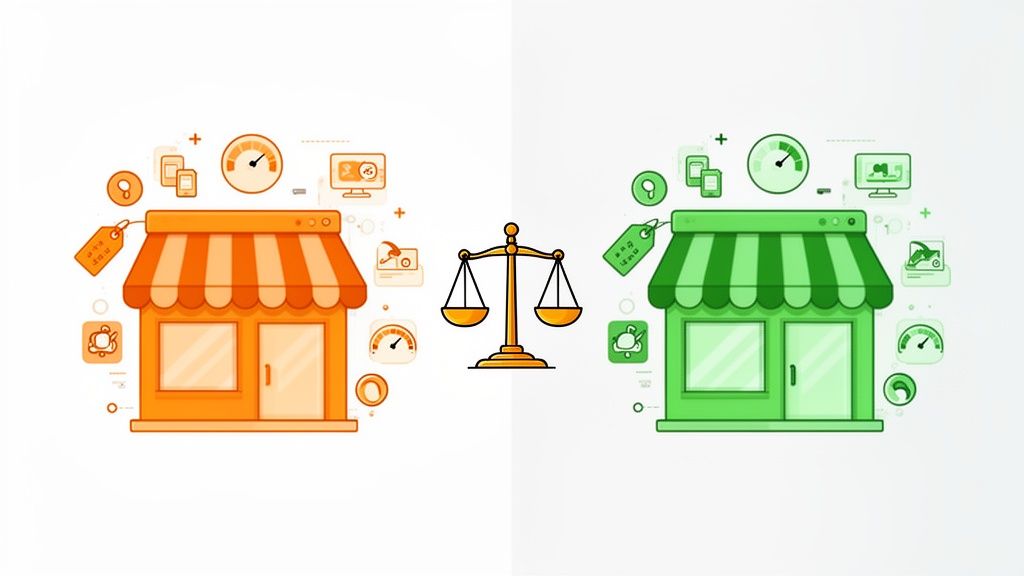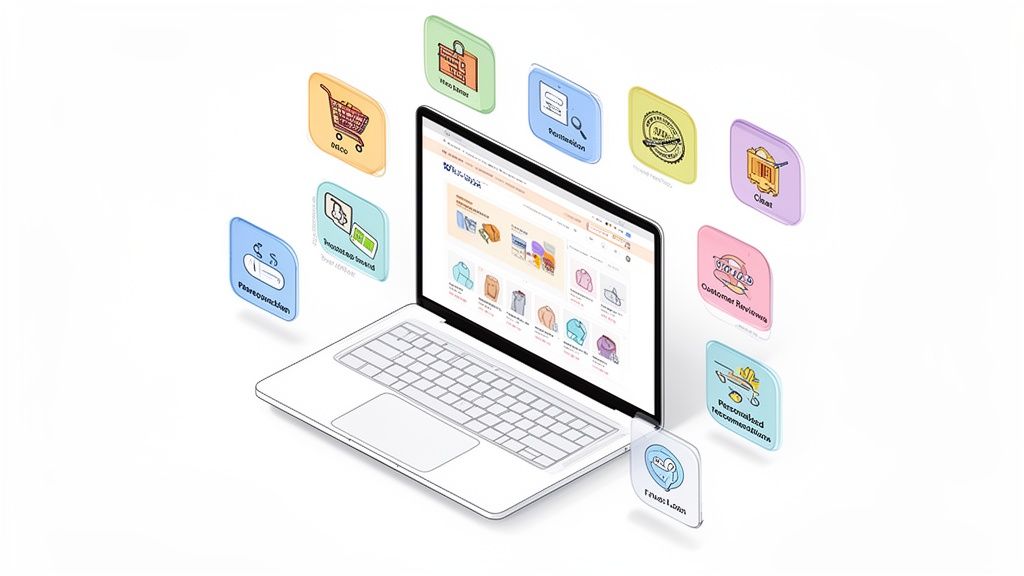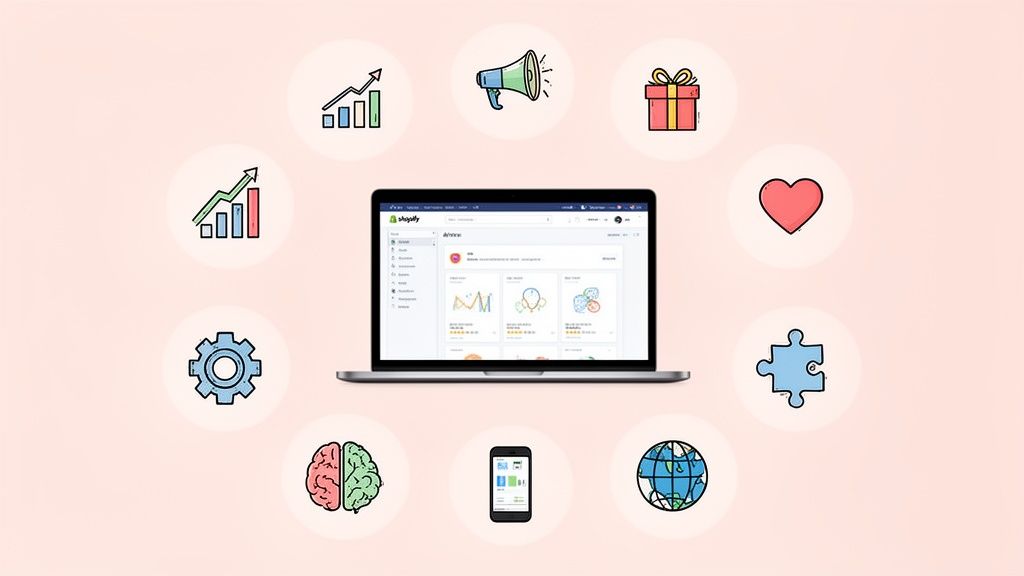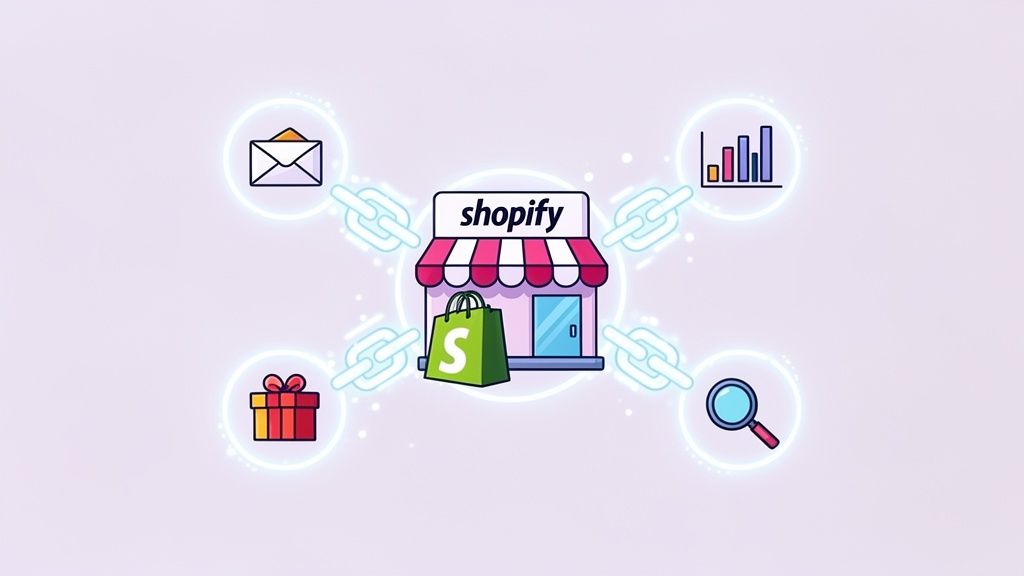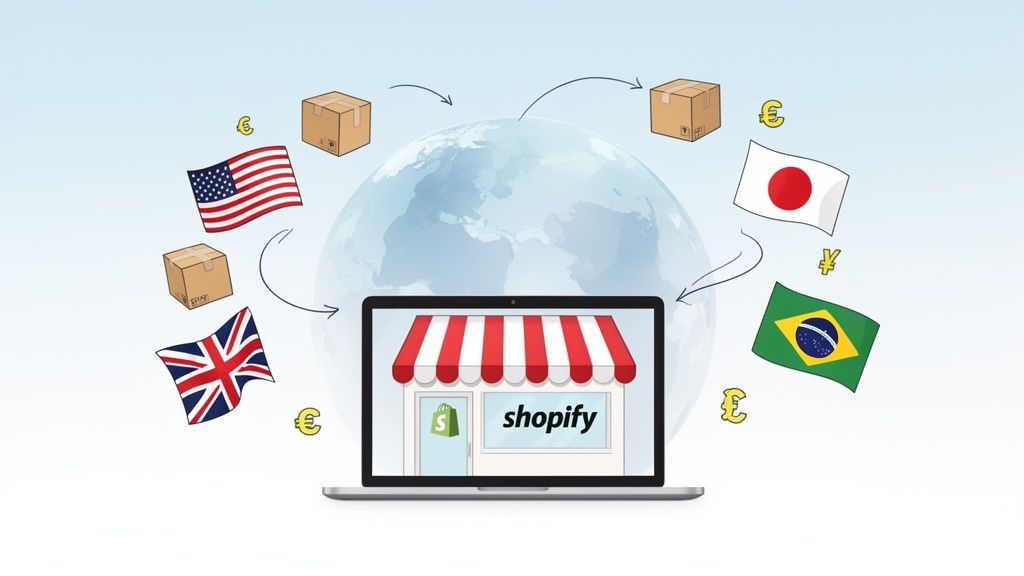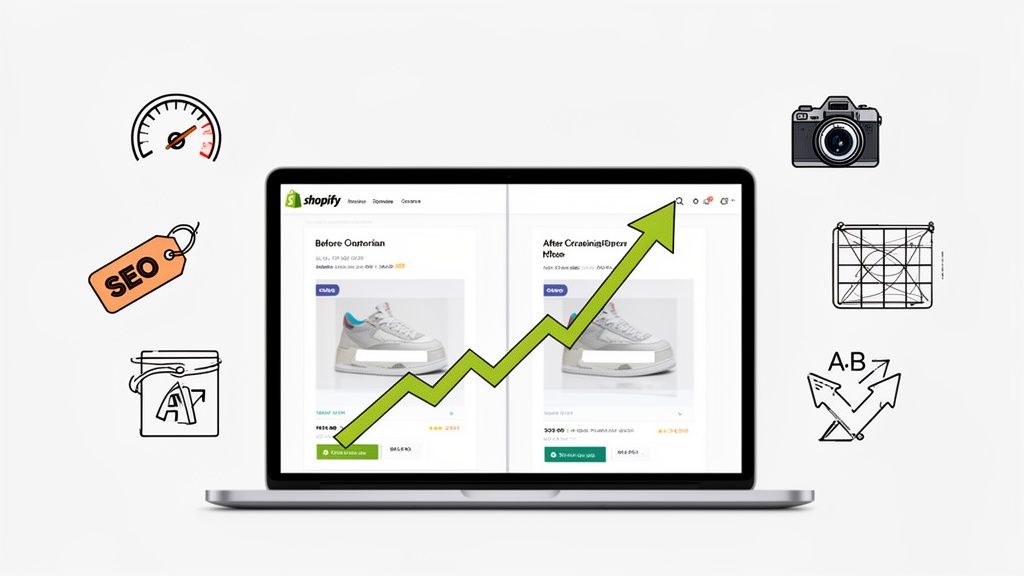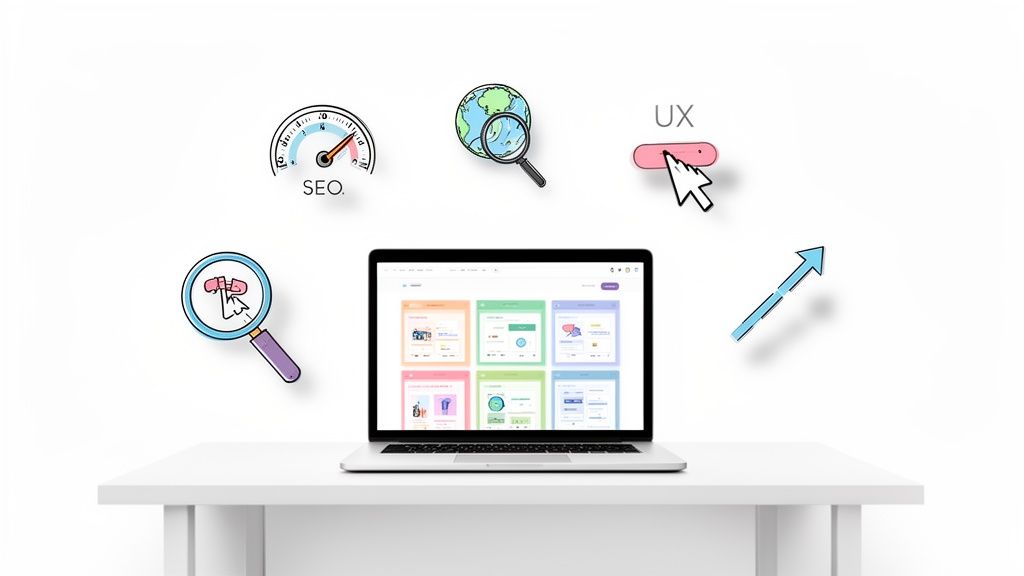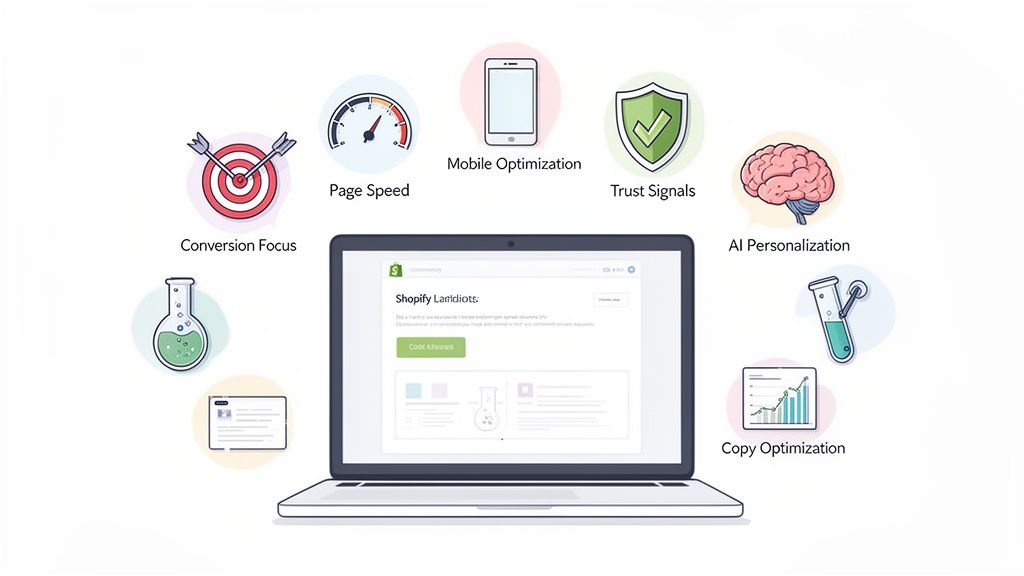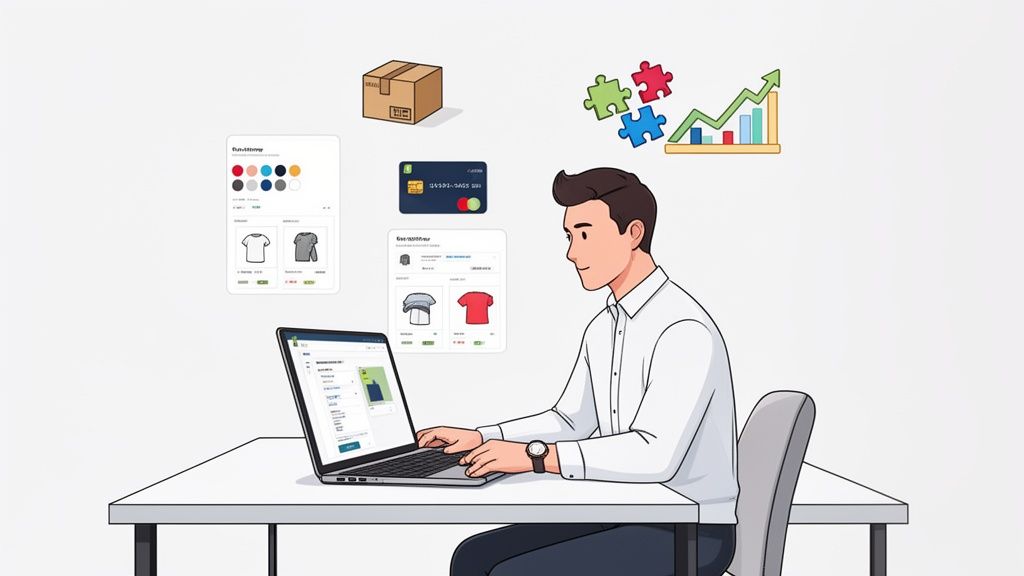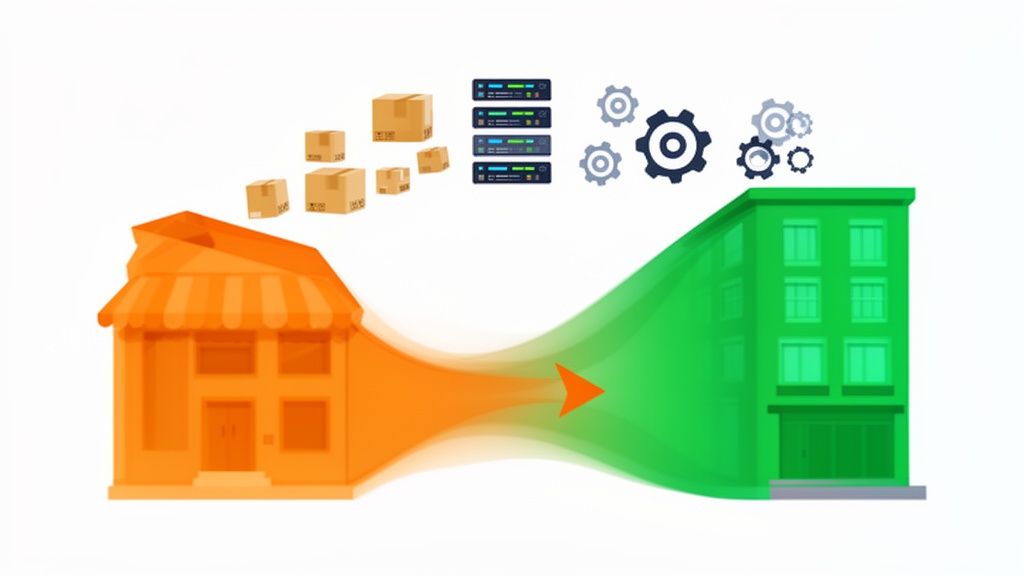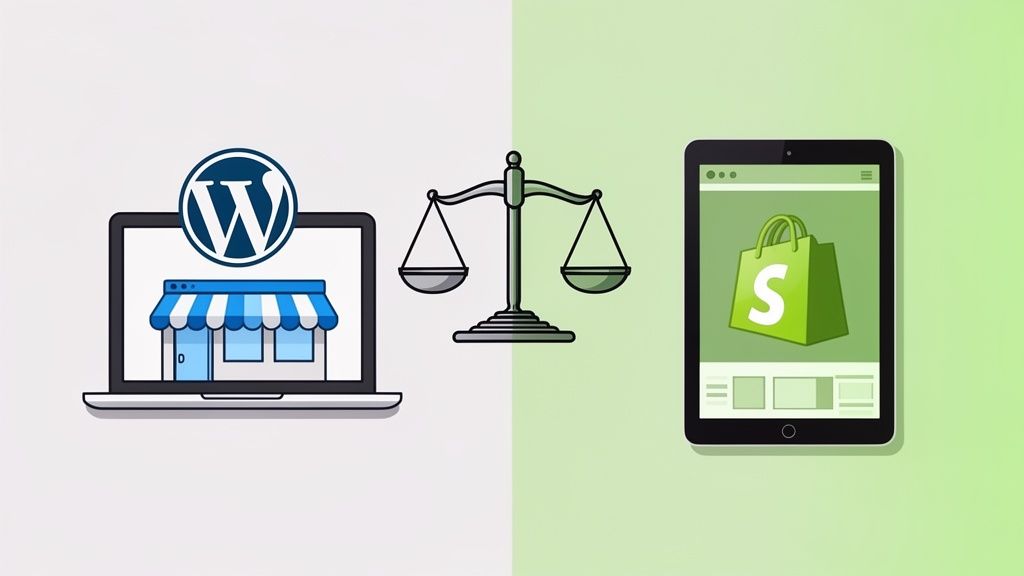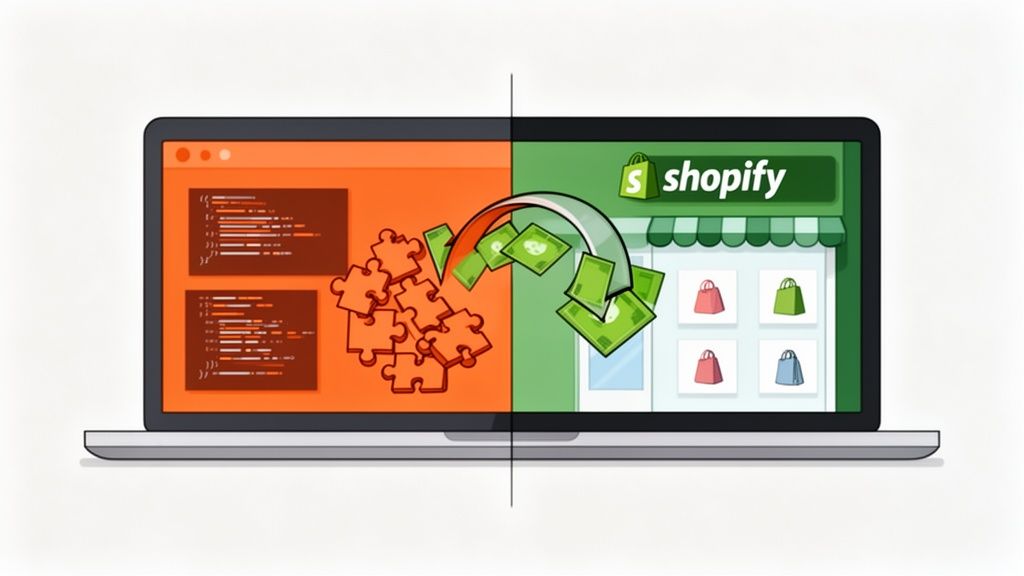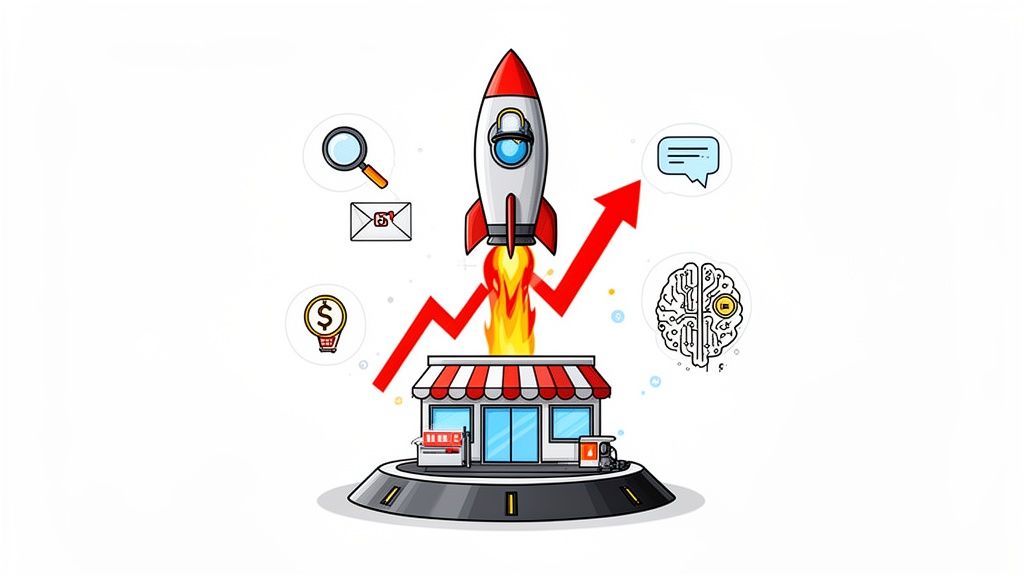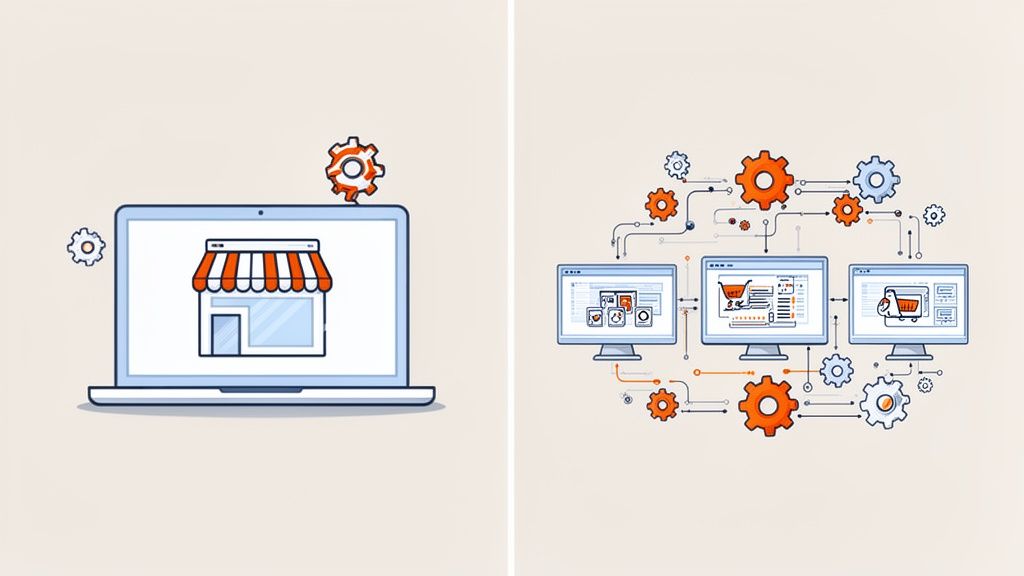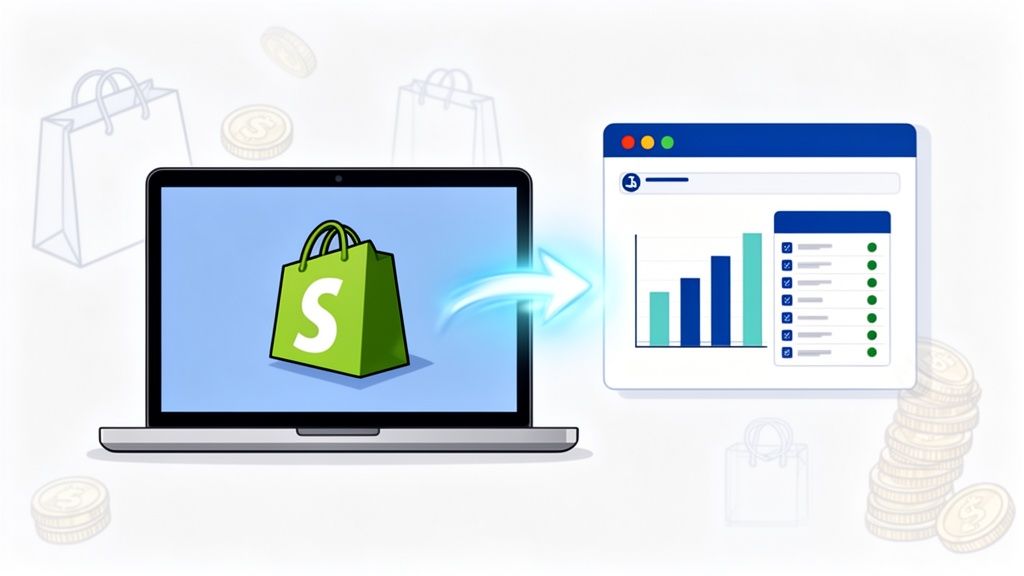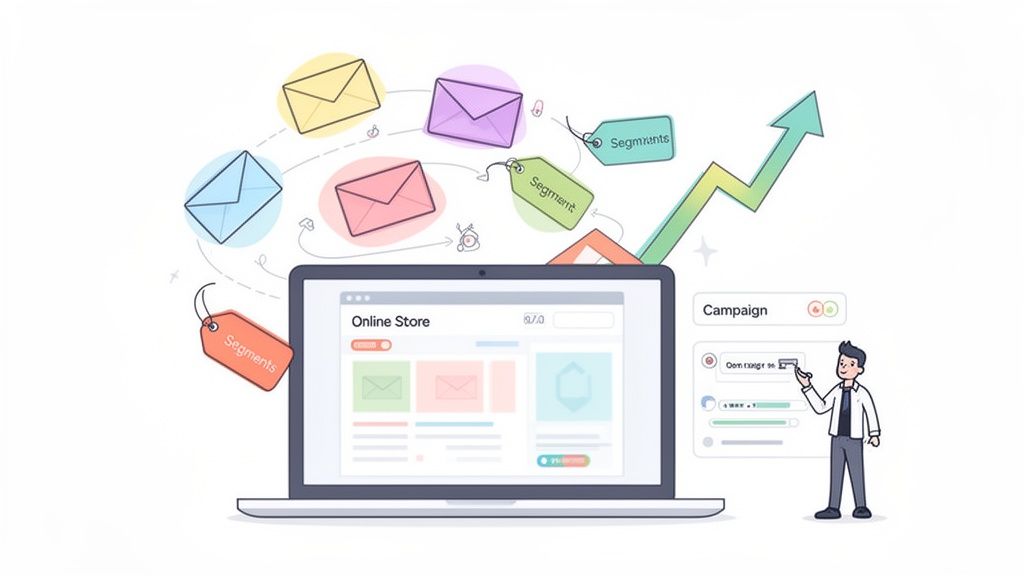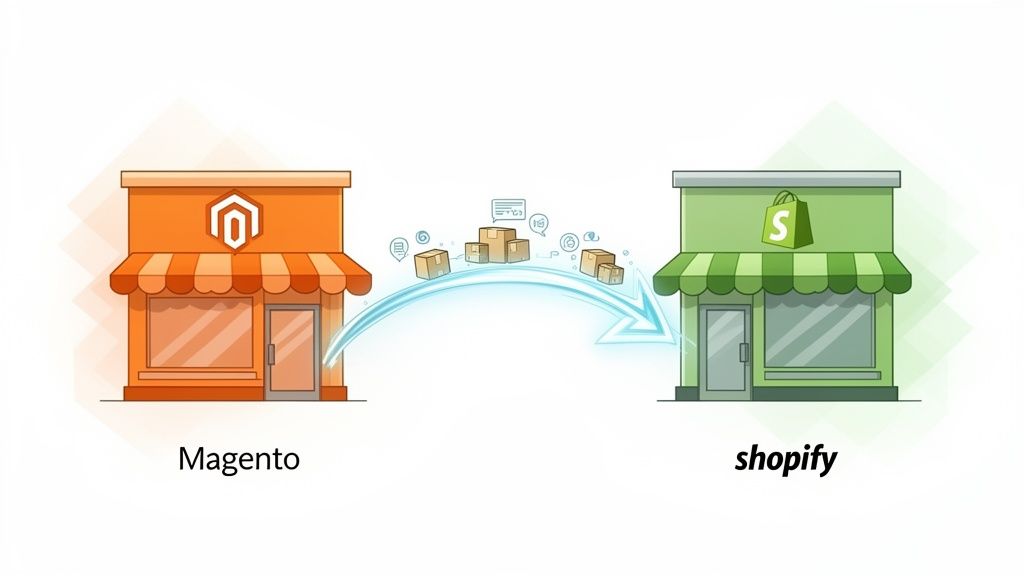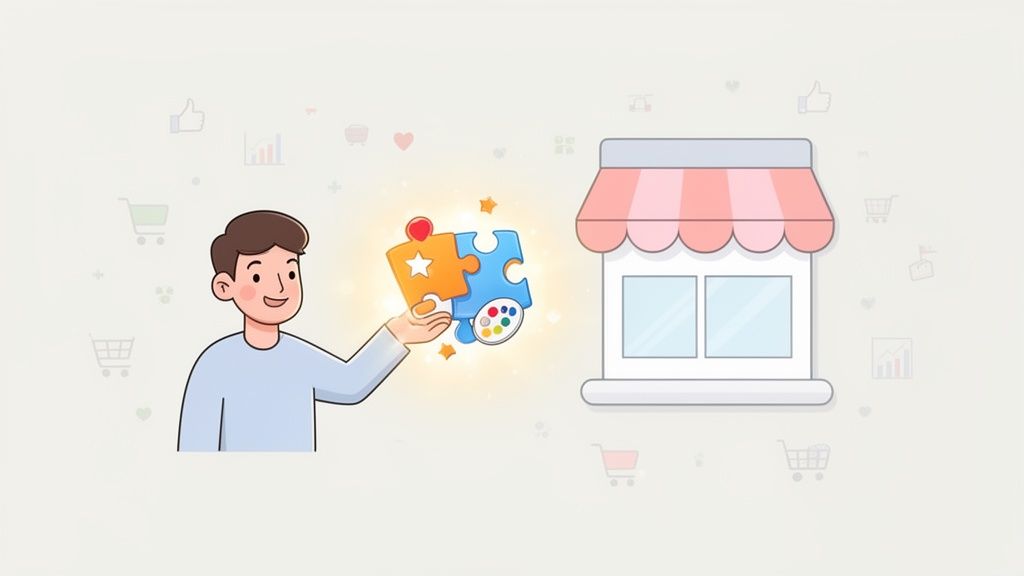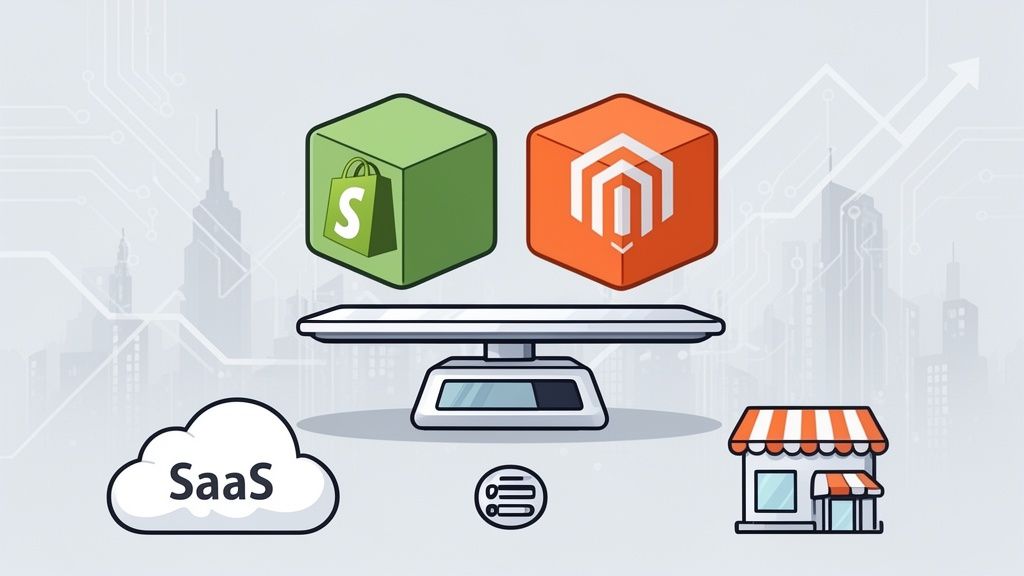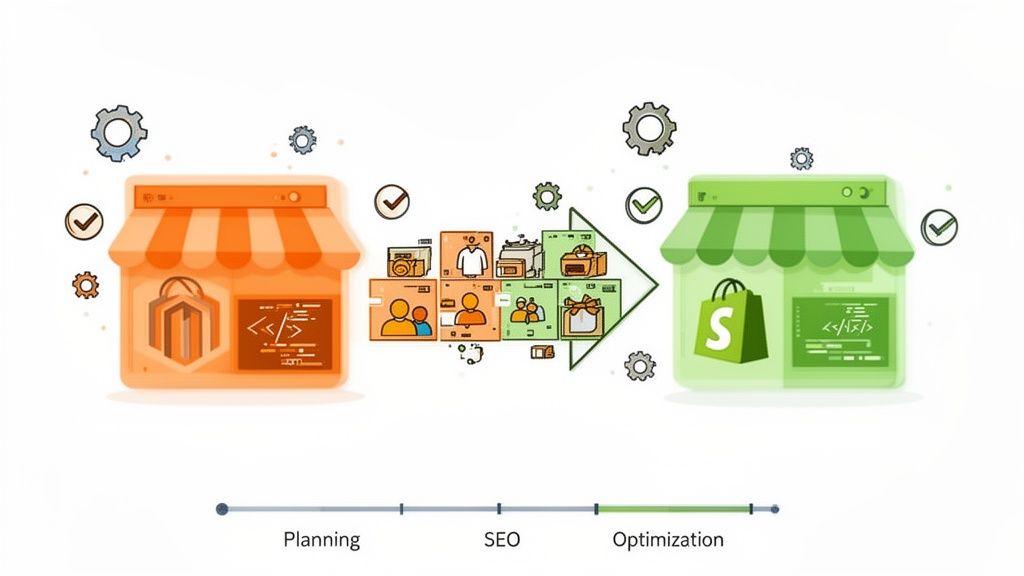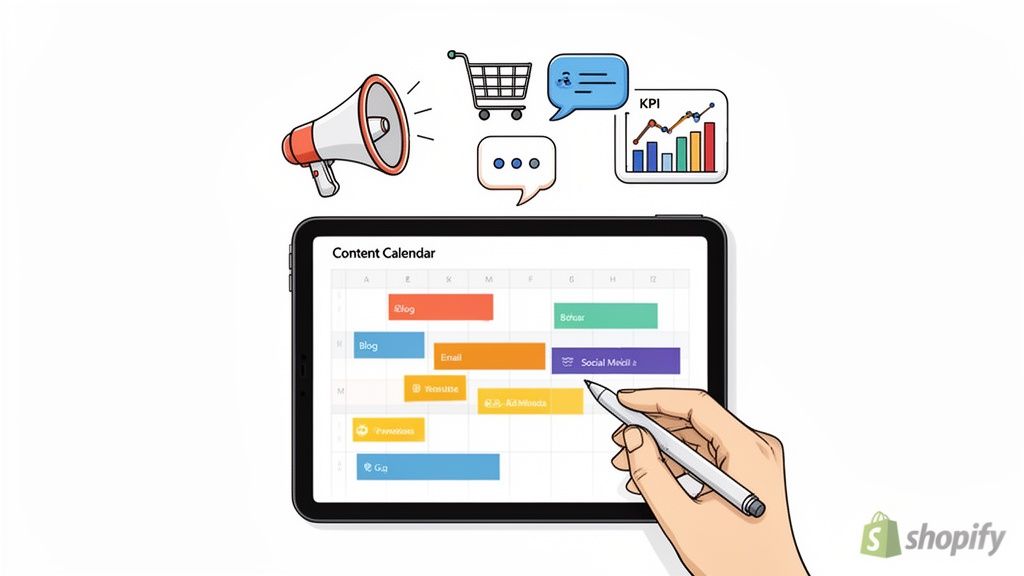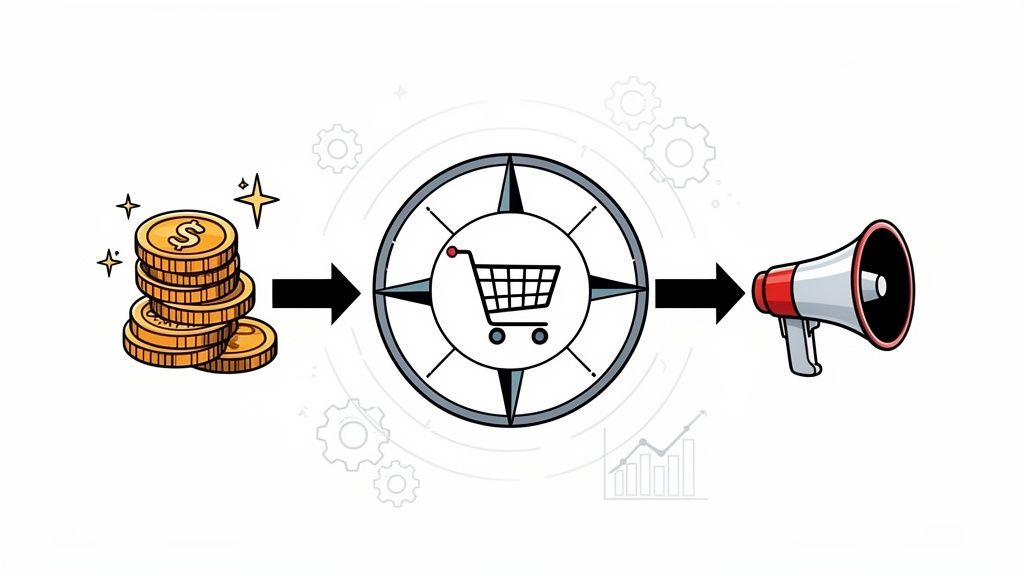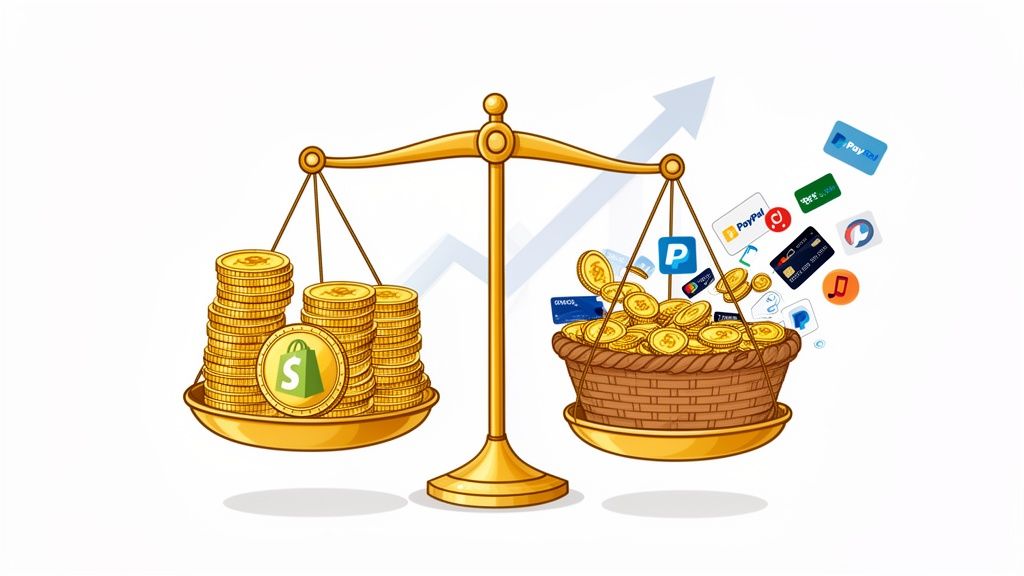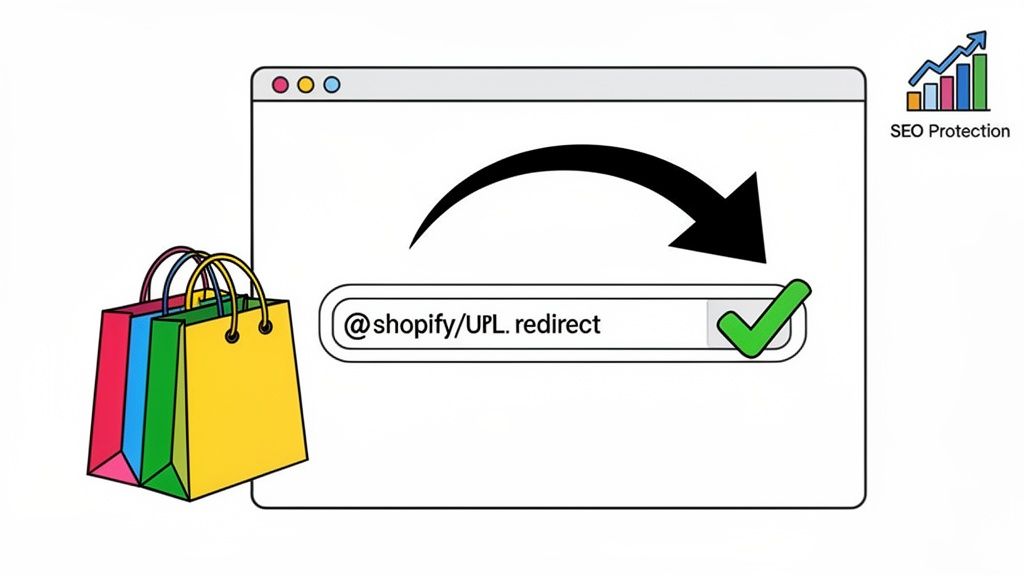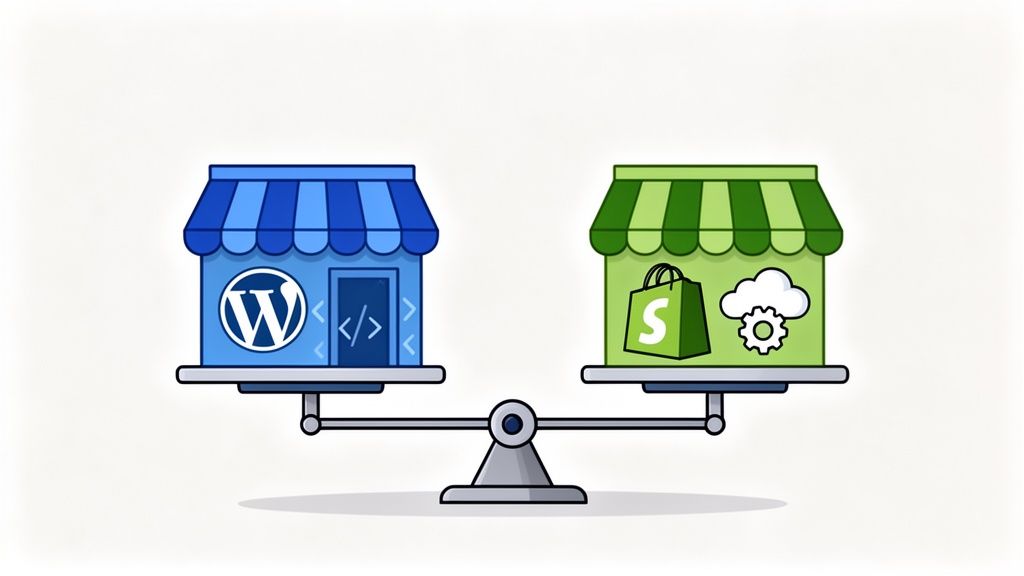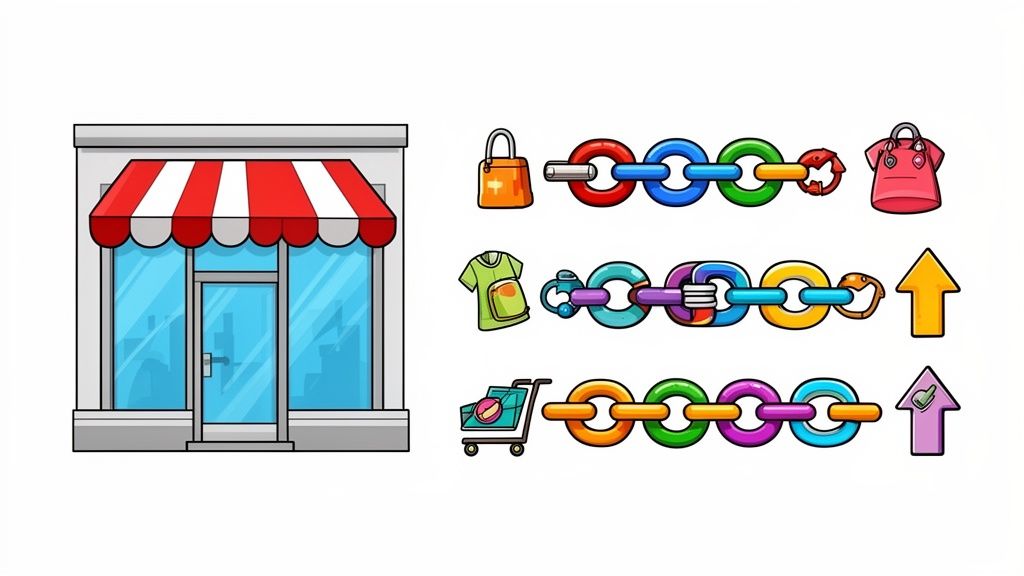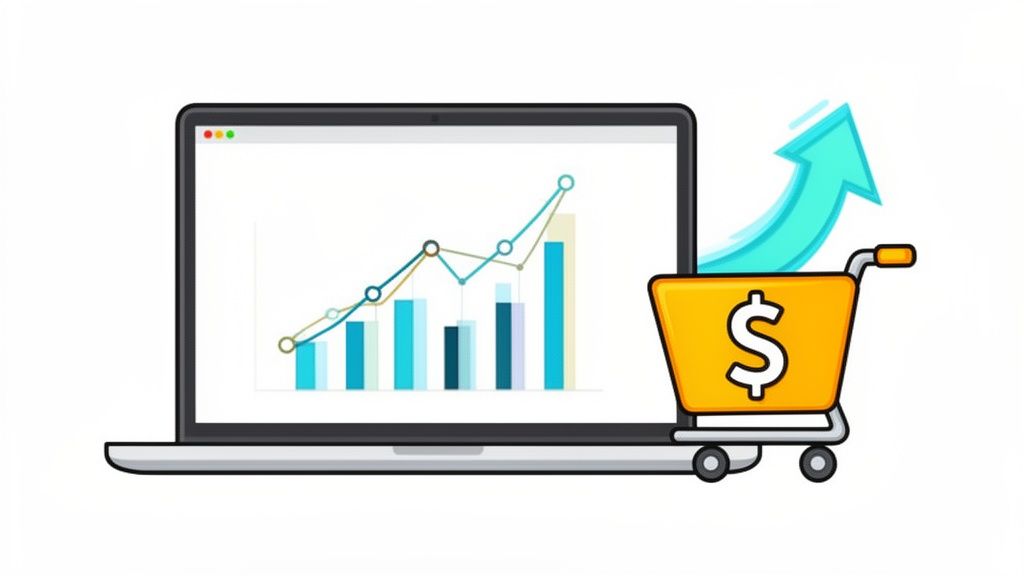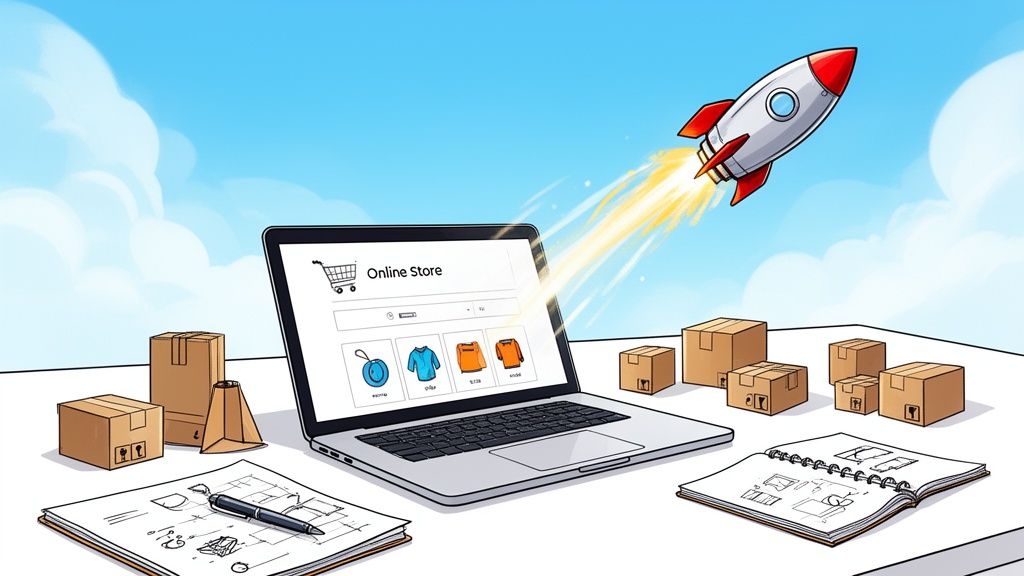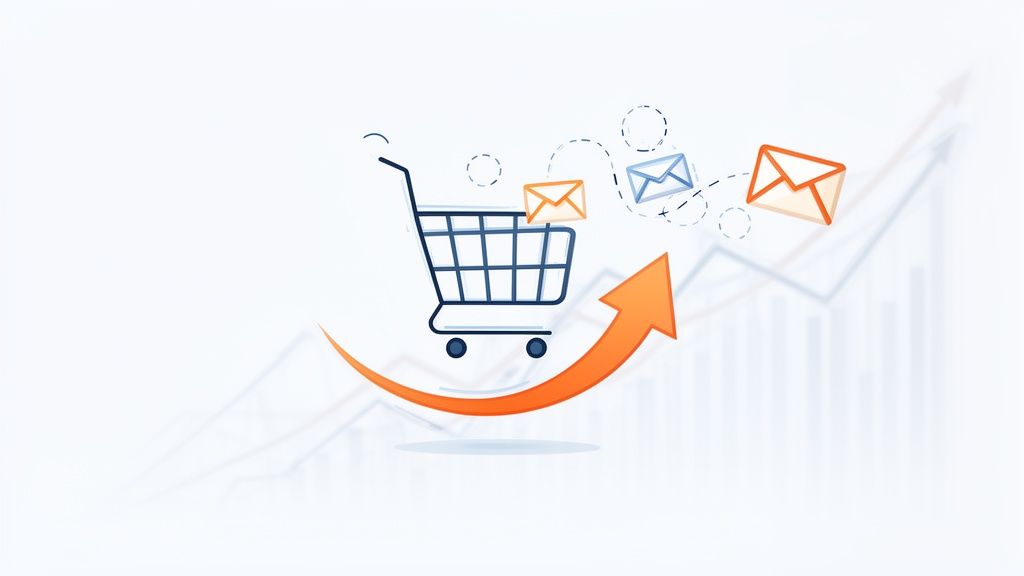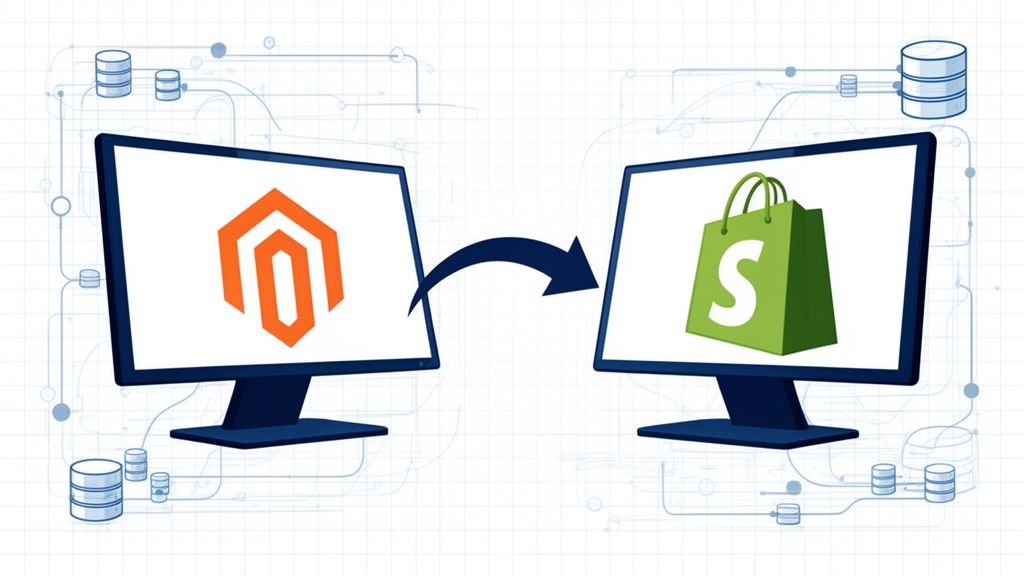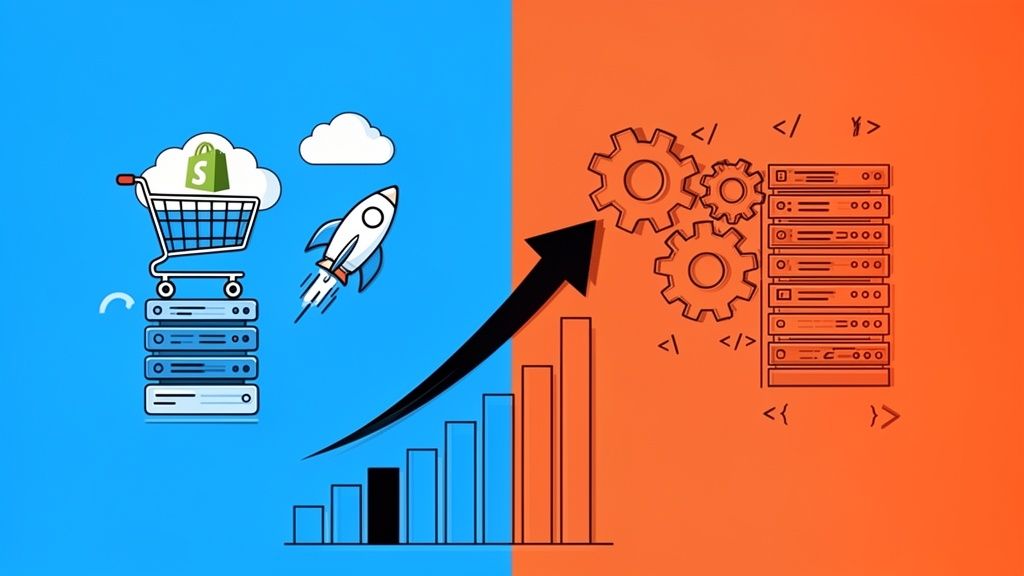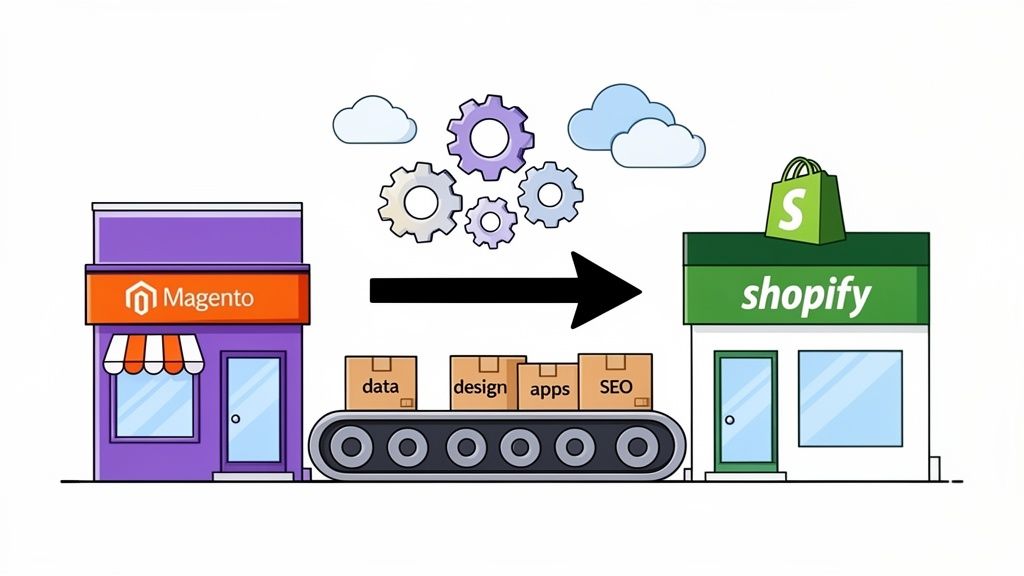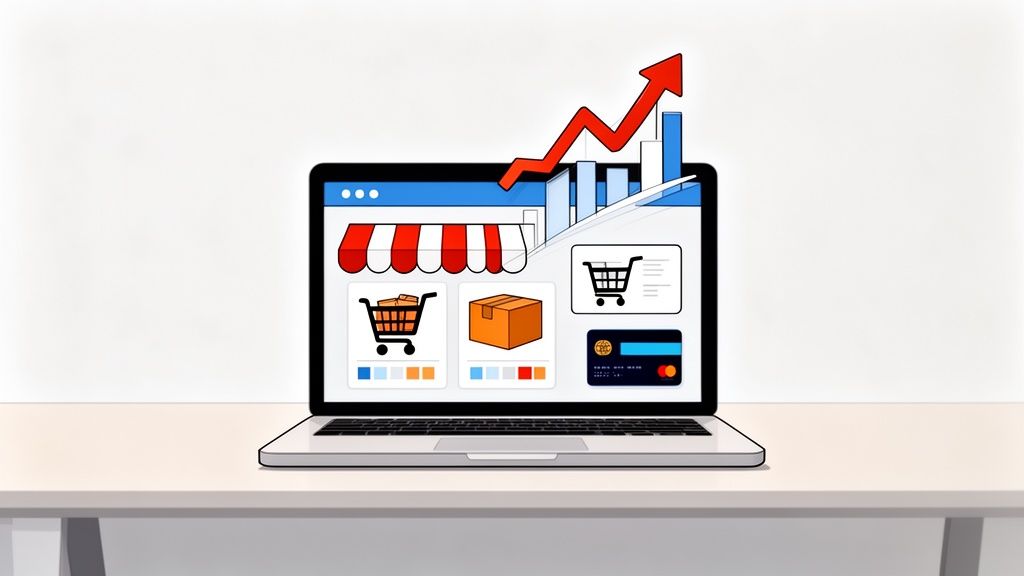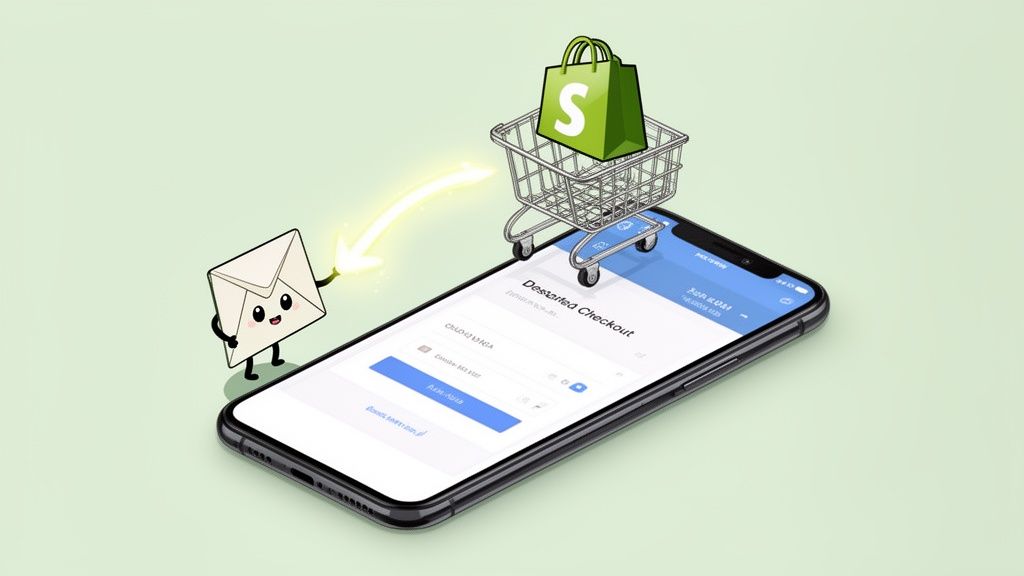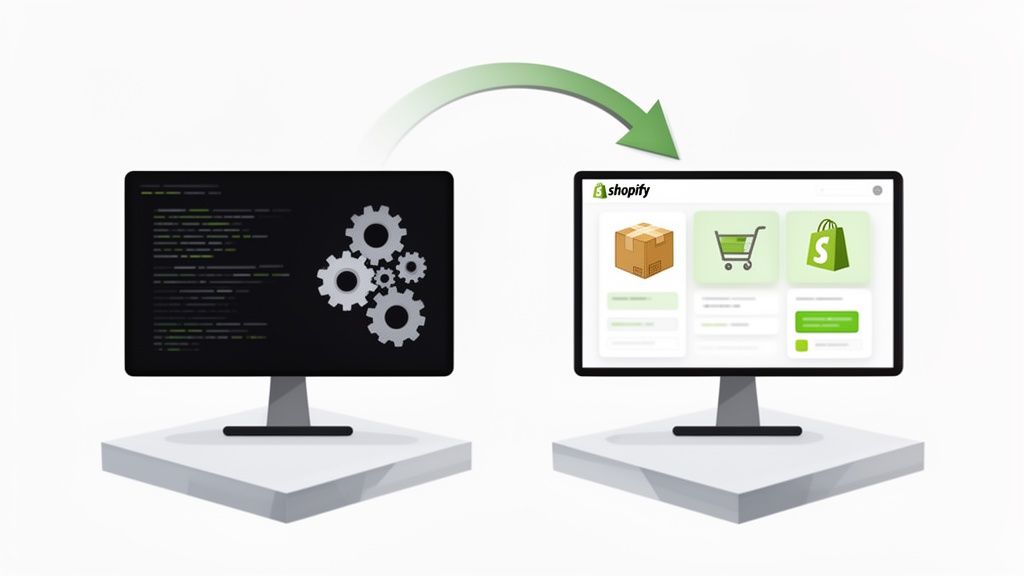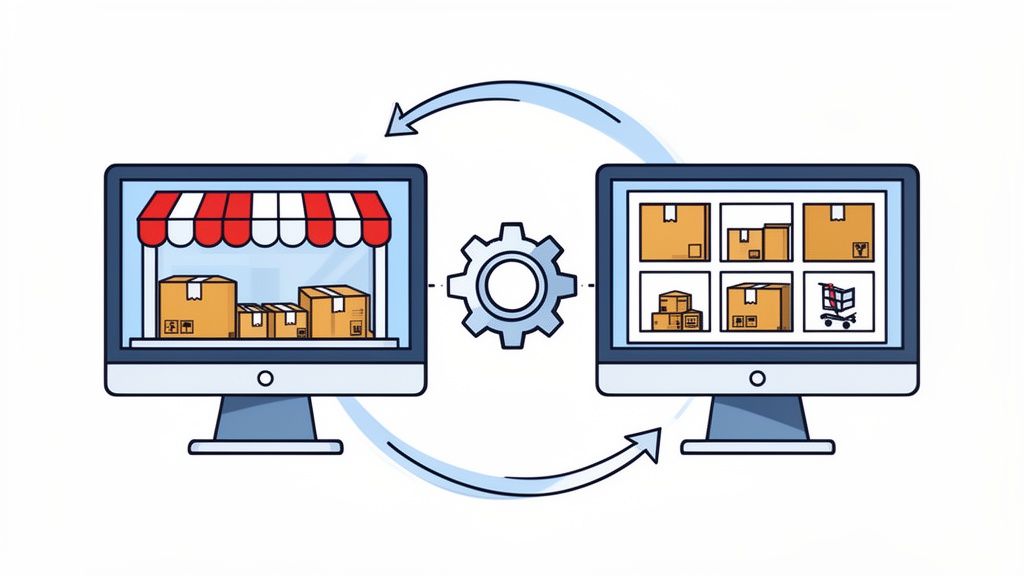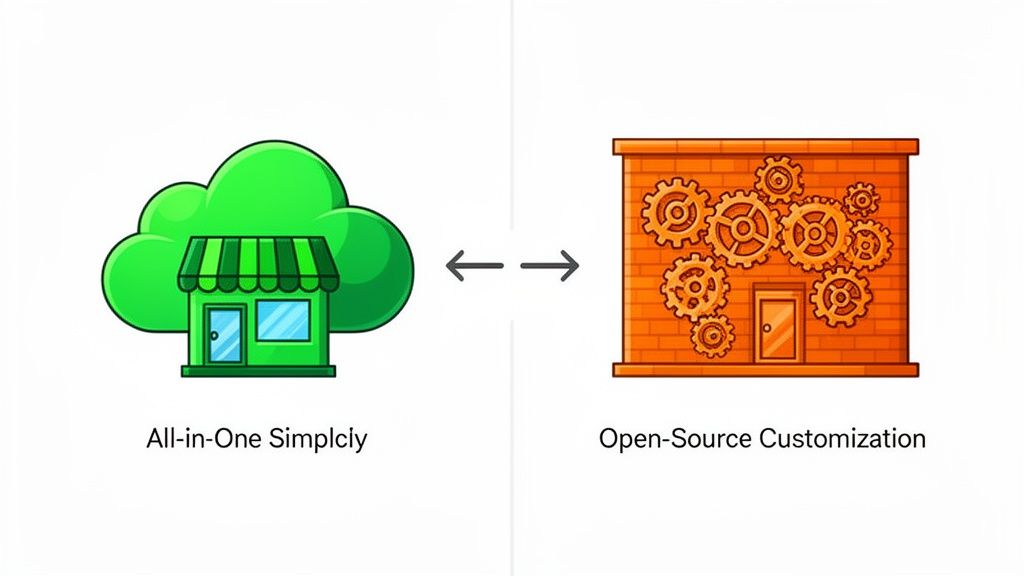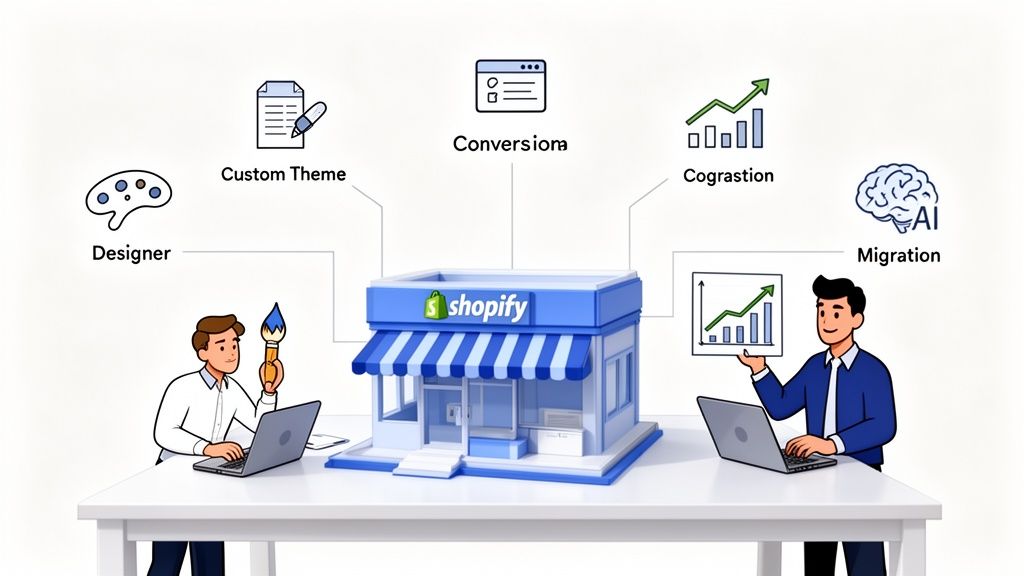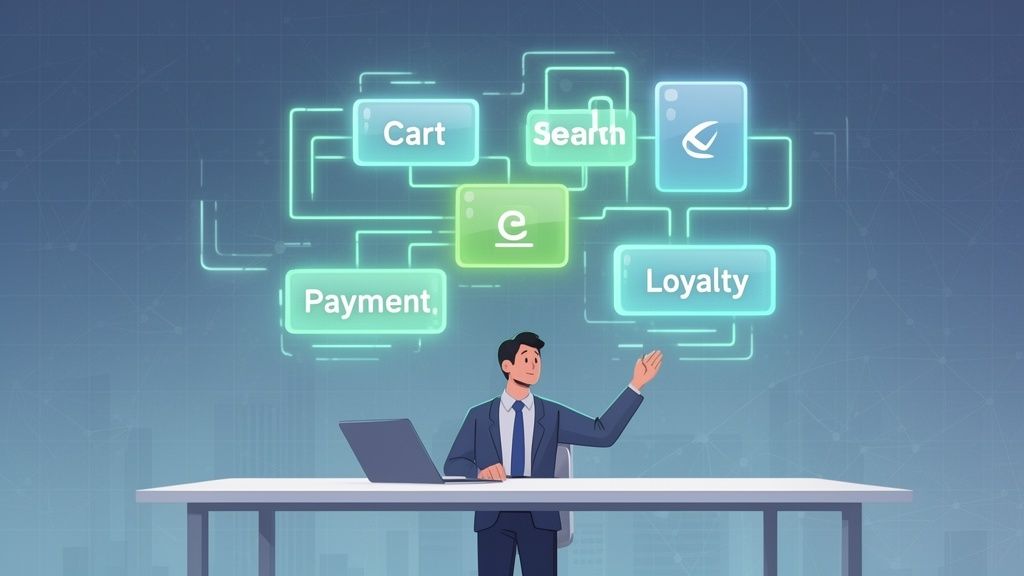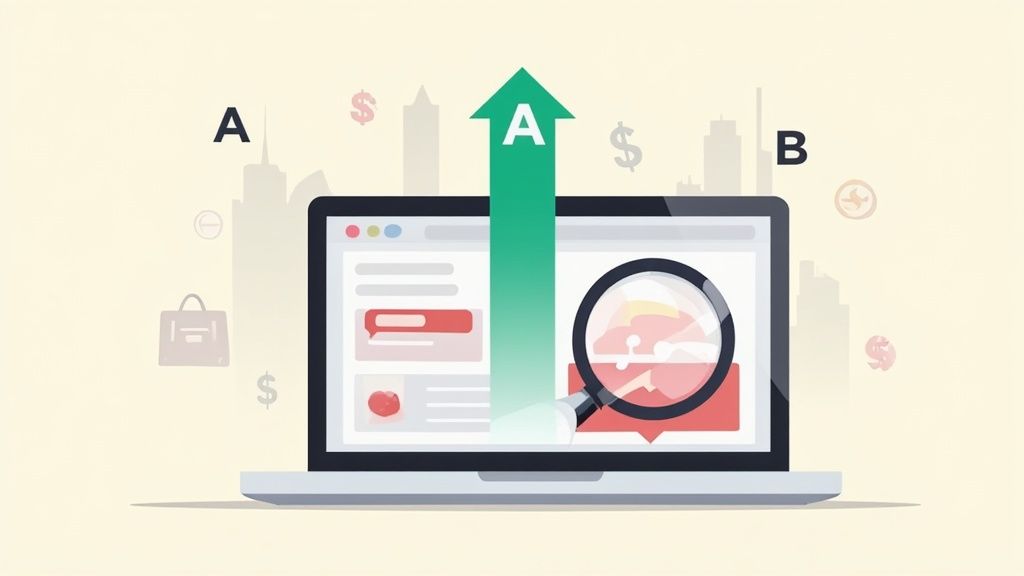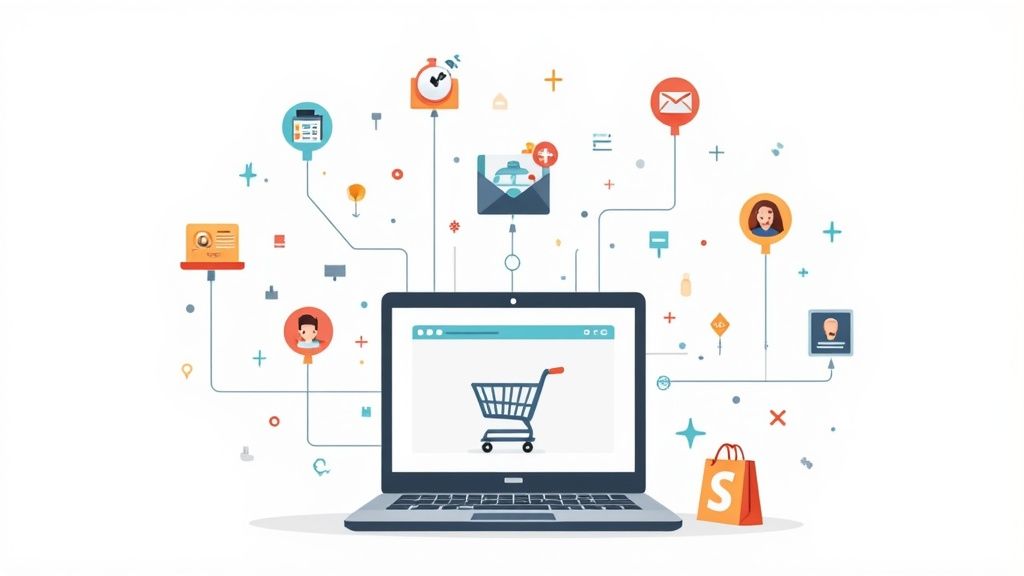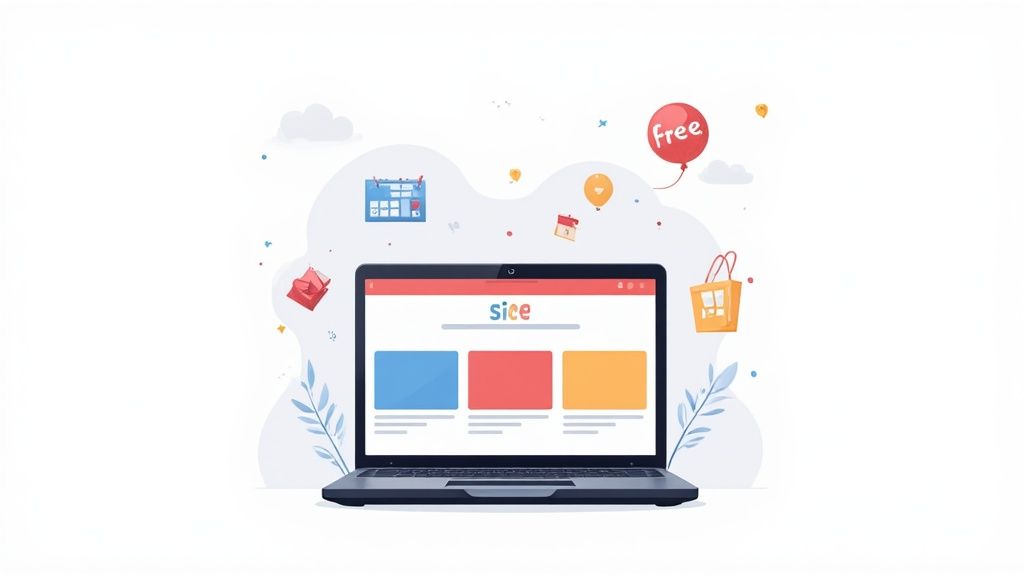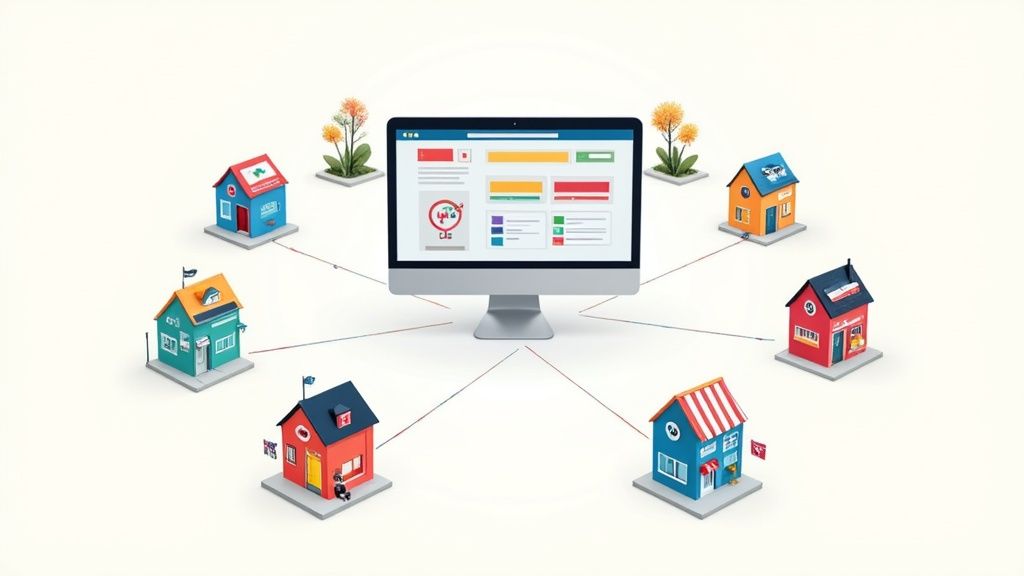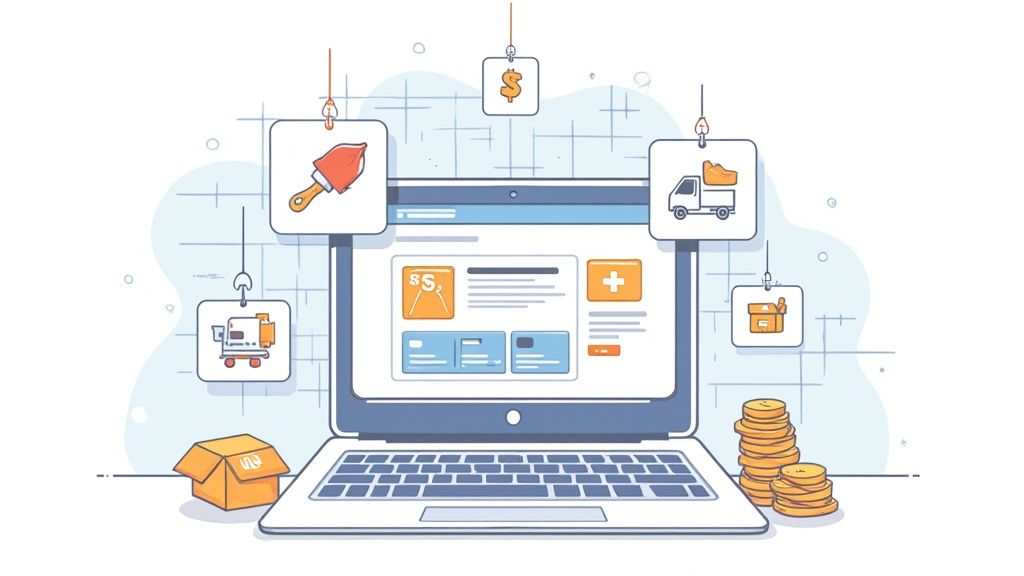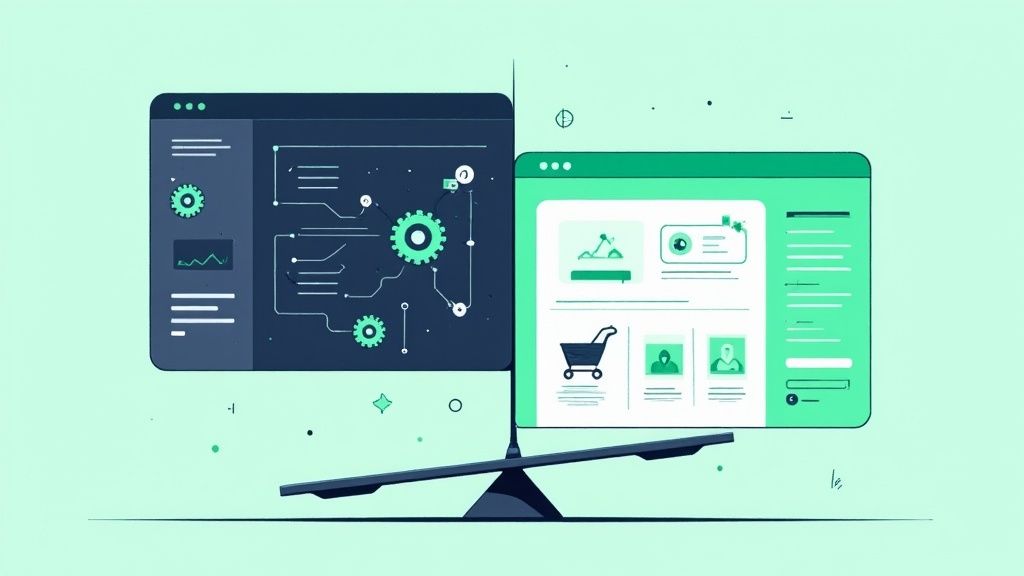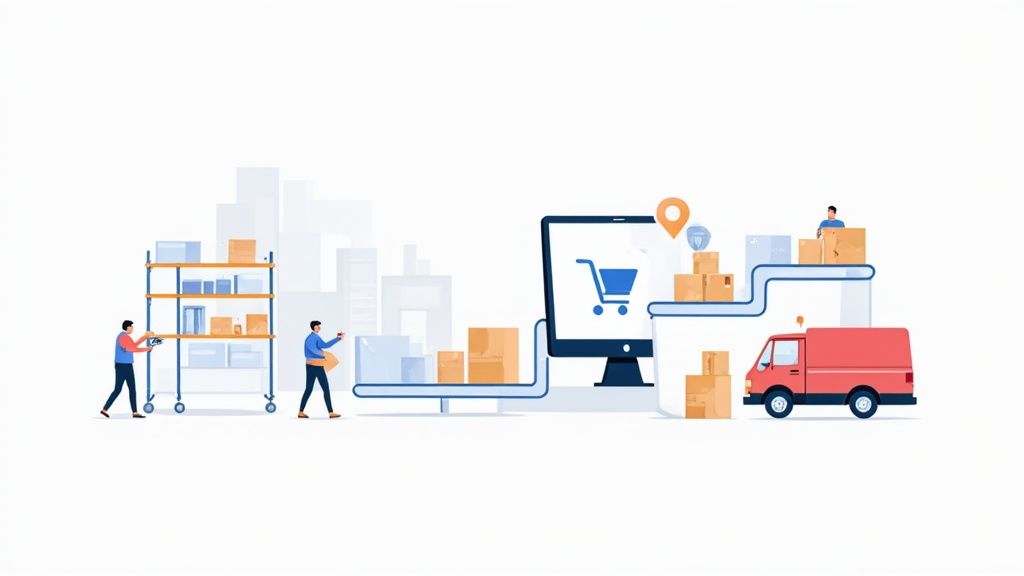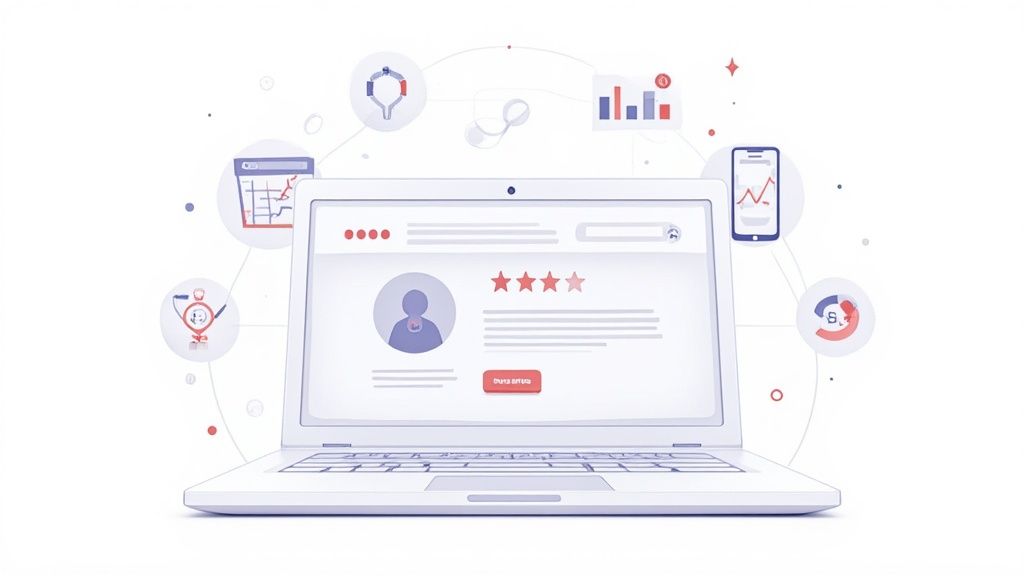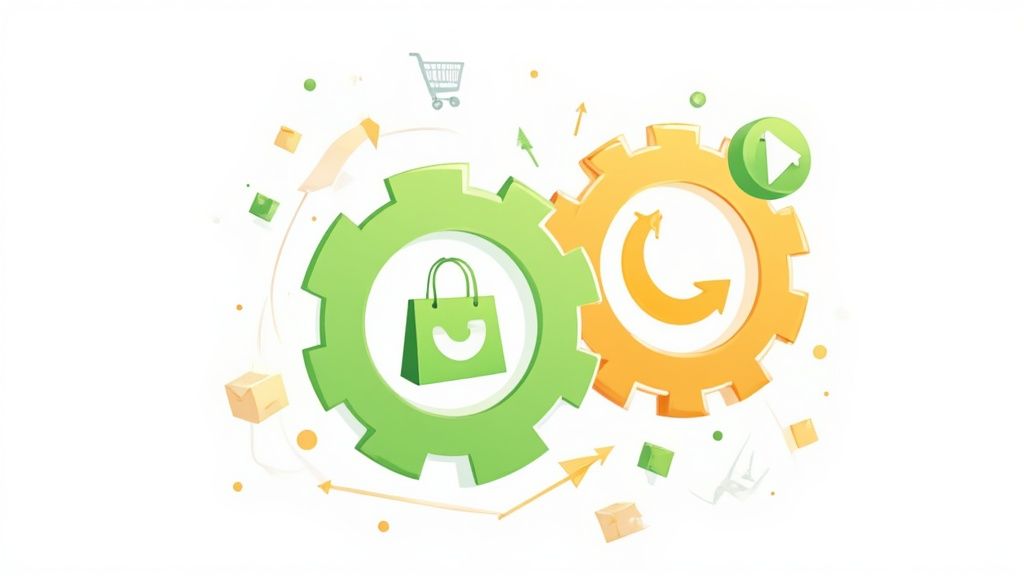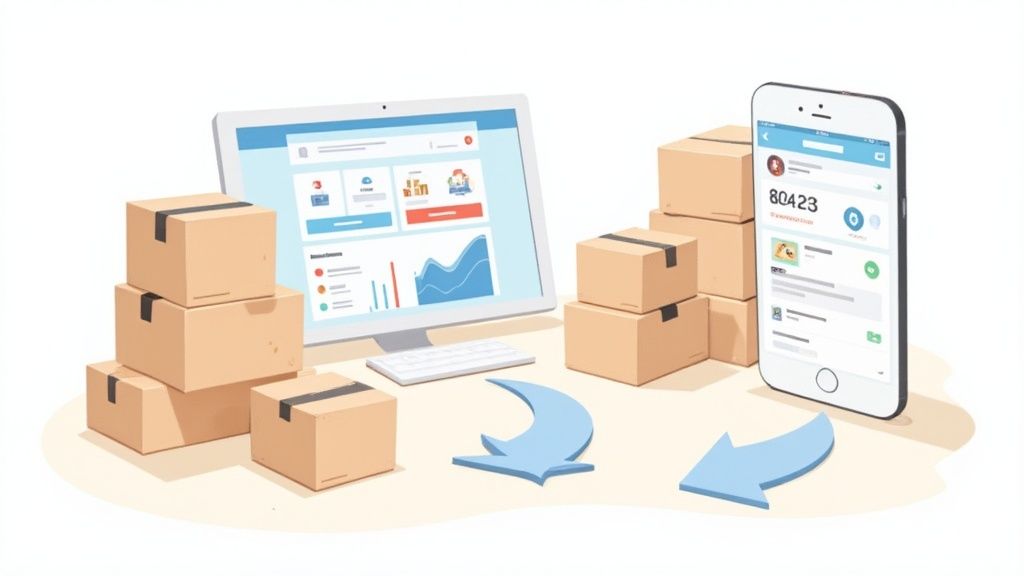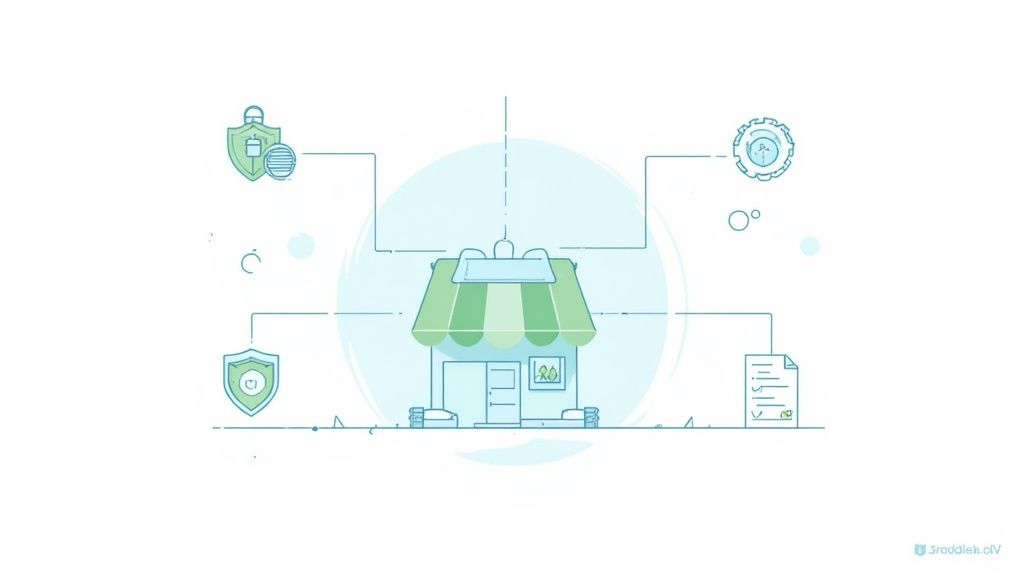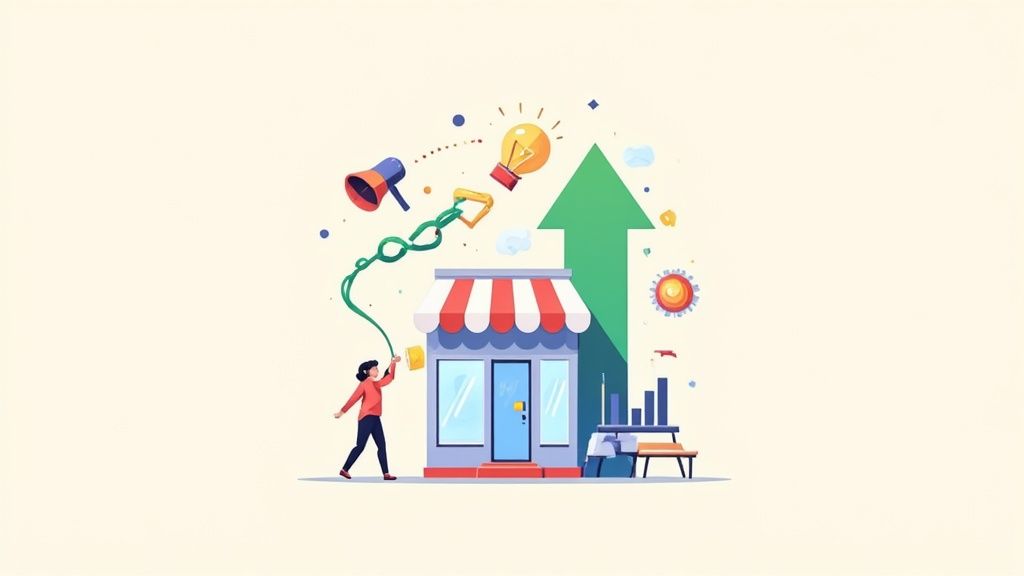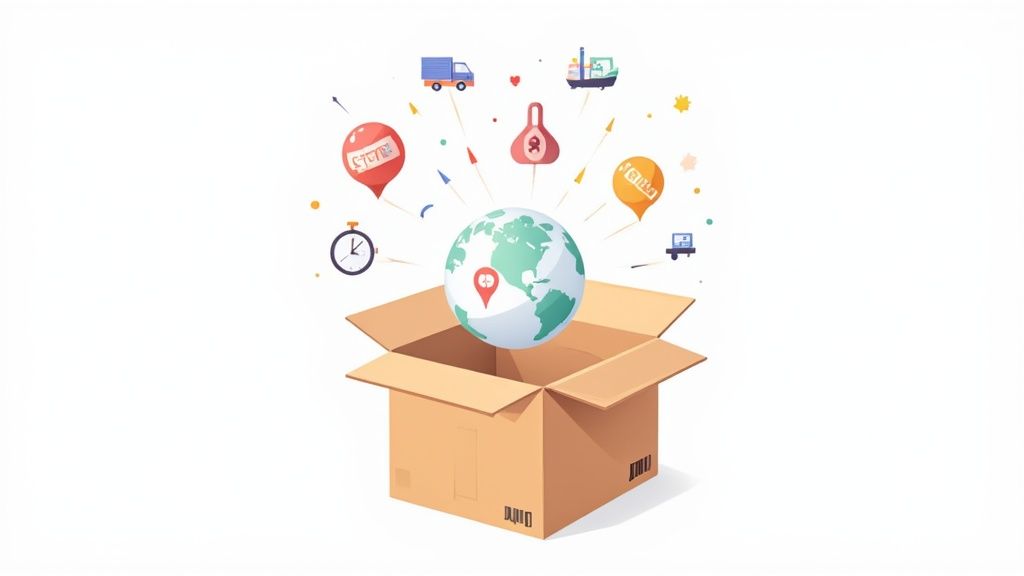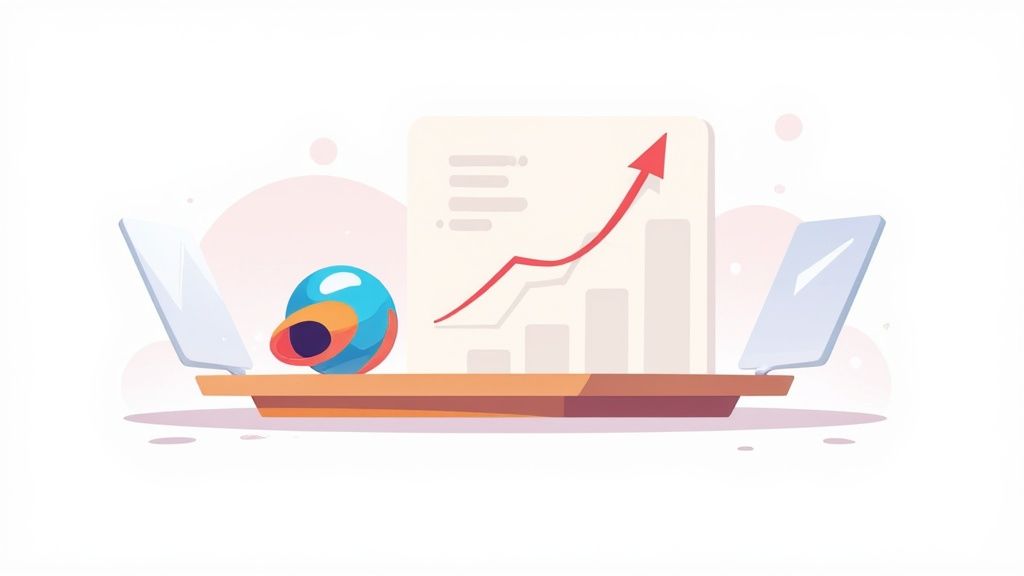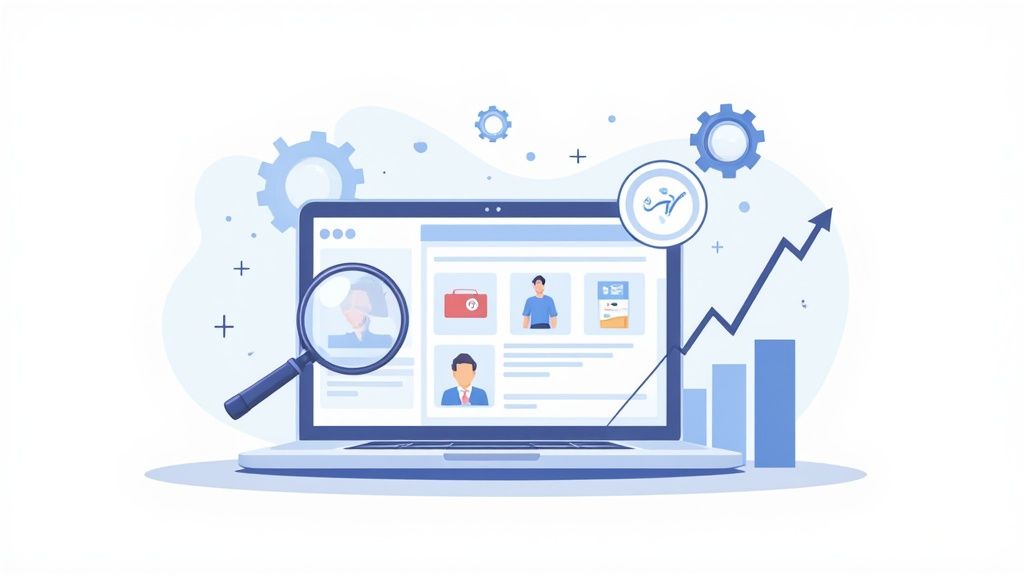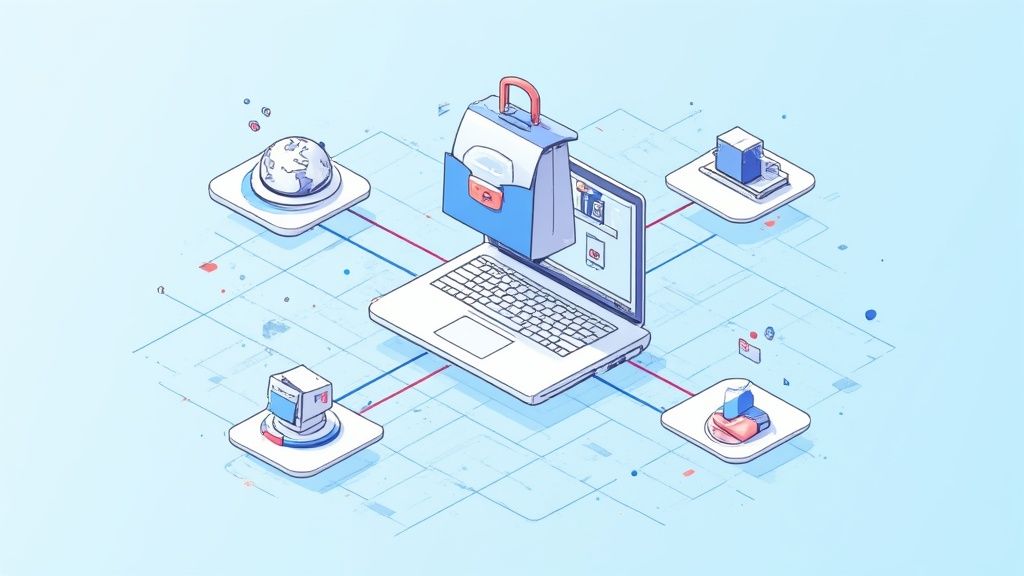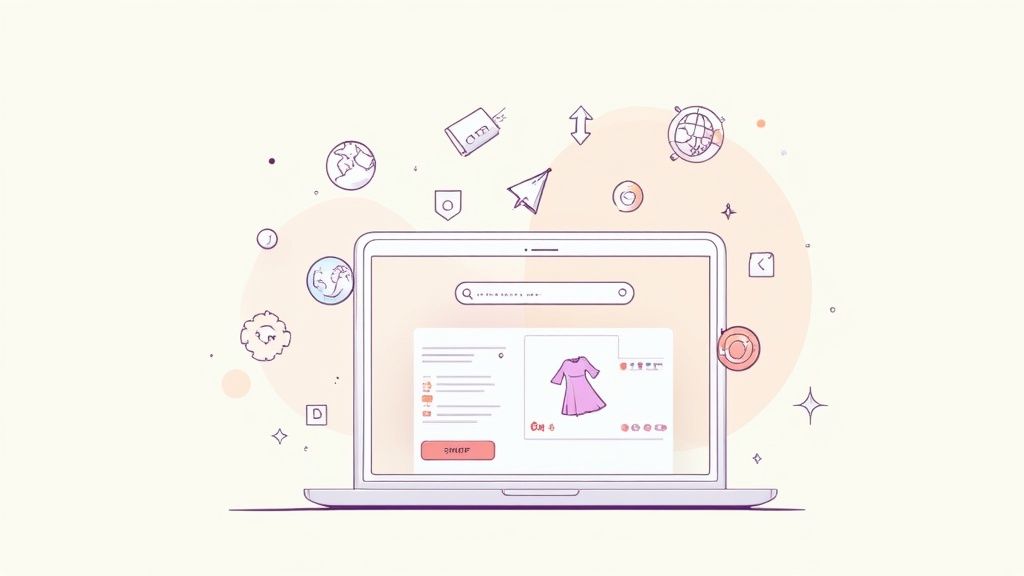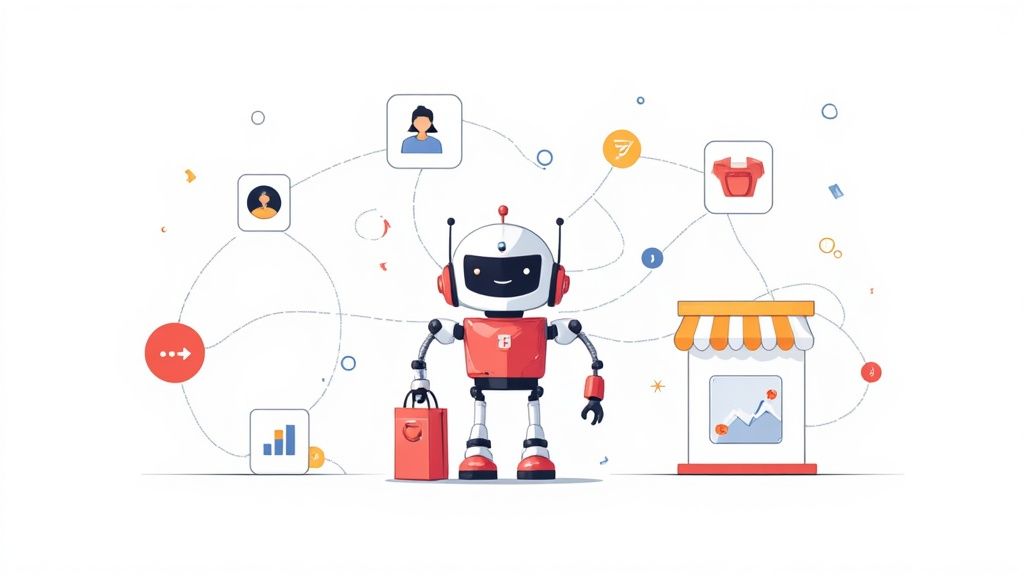
Imagine walking into an online store that knows what you want, almost before you do. That’s the magic of AI in ecommerce. The biggest wins? Dramatically better personalization, smoother operations behind the scenes, and a real impact on your bottom line. This isn't some far-off concept anymore; it's a core tool for anyone serious about selling online.
The New Reality of AI-Driven Ecommerce Success
Artificial Intelligence has officially moved out of the "buzzword" category and into the "must-have" toolkit for modern online retail. The best way to think about it is as a super-smart assistant that works around the clock for both your business and your customers. It tailors shopping experiences on the fly, handles complex back-end tasks without breaking a sweat, and even finds new ways to make money that simply weren't possible before.
And this isn't just theory—it's creating a massive competitive gap. The market for AI in e-commerce is already sitting at around $8.65 billion, and experts see it rocketing to $17.1 billion by 2030. Stores that are already on board are reporting revenue bumps between 10-12% on average. Even better, AI-driven efficiencies are expected to boost profitability by a whopping 59% by 2035. You can dig into more of these AI in ecommerce statistics to see how the market is shifting.
Tangible Business Growth
The real power of AI goes way beyond a simple chatbot. It touches almost every corner of an ecommerce business, delivering results you can actually measure.
- Personalized Experiences: AI algorithms watch how customers browse and buy, then serve up product recommendations so spot-on it feels like having a personal shopper.
- Smarter Inventory Management: Instead of guessing, predictive analytics forecast demand with incredible accuracy. This means no more money tied up in dusty overstock and no more disappointing "out of stock" messages for your customers.
- Enhanced Customer Support: Smart chatbots are on duty 24/7, answering questions in a heartbeat and nudging shoppers toward a confident purchase.
This image really drives home how AI personalization directly fuels key ecommerce metrics.
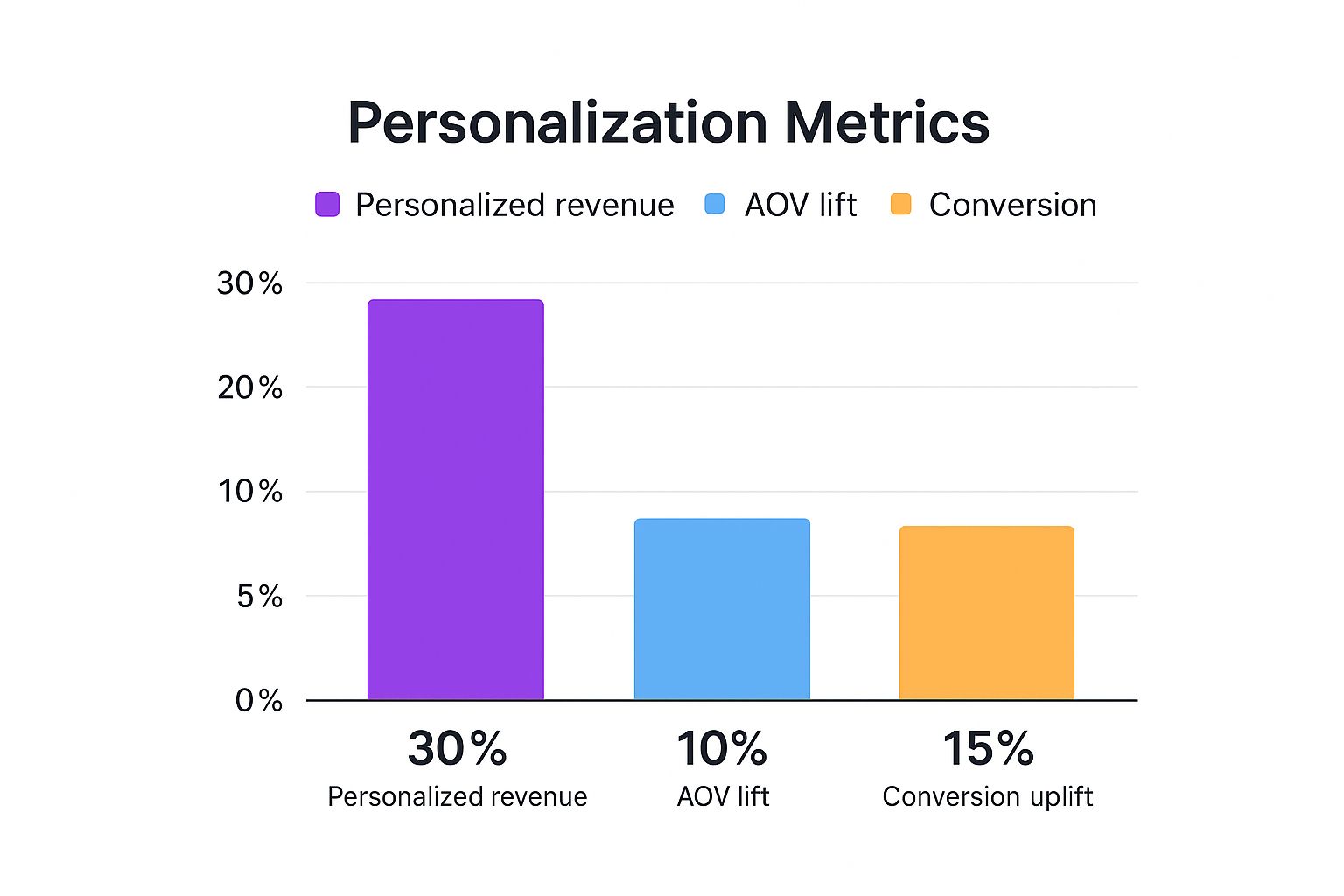
The numbers don't lie. When AI crafts a shopping experience just for an individual, it leads directly to more conversions, bigger carts, and a significant lift in revenue from those personalized offers.
To put it all together, here's a quick look at how these AI tools connect directly to the growth goals every ecommerce brand is chasing.
Core AI Benefits for Ecommerce Growth
This table summarizes how key AI applications directly address major business goals in the ecommerce sector.
Ultimately, each of these applications works together, creating a smarter, more efficient, and more profitable business from the ground up.
Crafting Hyper-Personalized Customer Journeys

Think about the difference between grabbing a suit off the rack and having one custom-made by a tailor. The off-the-rack version might fit okay, but the tailored one feels like it was made just for you—because it was. This is one of the biggest ways AI is changing the e-commerce game; it becomes a personal tailor for every single person who visits your site.
AI goes way beyond those basic "you might also like" recommendations. It crunches massive amounts of data in real-time—browsing history, past purchases, what someone clicked on, and even how long they stared at a particular product. All this information comes together to create a shopping experience that's unique and constantly adapting to each individual.
This isn't just about shuffling products around in a "customers also bought" section. Real AI personalization means your entire digital storefront can feel like it was built from the ground up for that one shopper.
Building a One-to-One Shopping Experience
Behind the scenes, AI algorithms are working nonstop to build a dynamic profile for every customer. With each click and every visit, that profile gets updated, allowing the system to make some seriously accurate predictions about what that person will want to see next.
The results are powerful. The journey through your store feels intuitive, helpful, and almost like you're reading their mind. This level of customization isn't just a nice-to-have anymore; it’s a deciding factor for a huge chunk of shoppers. In fact, over 50% of online shoppers now say a tailored experience is important when they're deciding where to spend their money. AI can suggest incredibly relevant products based on past behavior, shaping the entire visit to a person's tastes and bringing them back again and again. You can dig into more stats about AI's impact on ecommerce on vonage.com.
AI transforms your store from a static catalog into a living, breathing space that understands customer intent. It's the digital equivalent of a great sales associate who knows your style and anticipates your needs before you even ask.
From Browsers to Brand Advocates
This hyper-personalization isn't just about making people feel good—it translates directly into real business growth. When customers feel understood, they don't just buy more; they come back.
Here’s how that deep connection pays off:
- Increased Average Order Value (AOV): By suggesting the perfect complementary items—the right belt for those new shoes, for example—AI nudges shoppers to add more to their carts.
- Higher Conversion Rates: A relevant experience removes the friction. It gets rid of the guesswork and guides users smoothly from just browsing to actually buying.
- Enhanced Customer Loyalty: Shoppers who get a personalized journey feel valued. They stop being one-time buyers and start turning into dedicated fans of your brand.
Ultimately, this tailored approach makes your store feel less like a faceless website and more like a trusted partner. You're not just selling products; you're building relationships that fuel long-term, sustainable growth.
Boosting Conversions with Intelligent Chatbots

What if you could have your absolute best sales associate available to every single customer on your site, 24/7? That's exactly what intelligent AI chatbots bring to the table. They’ve come a long way from the clunky, frustrating bots of the past, evolving into savvy conversational tools that actively guide shoppers toward a confident purchase.
These AI assistants get the nuances of conversation, remember past interactions, and serve up instant, accurate answers to common questions—think shipping, returns, or product specs. By smoothing over these friction points the second they pop up, they stop hesitation in its tracks and can dramatically slash your cart abandonment rates.
Turning Conversations into Sales
Today's AI chatbots are much more than just customer service agents; they're proactive sales drivers. By plugging into your product catalog and customer data, they can dish out personalized recommendations right inside the chat window.
For instance, a customer might ask about a specific dress. The chatbot can provide sizing info, but it can also suggest matching shoes or a handbag, naturally upselling in a way that feels genuinely helpful. This conversational commerce approach makes the shopping experience feel guided and personal, which bumps up both engagement and average order value.
The impact on your bottom line is pretty staggering. By 2025, it's projected that 12.3% of shoppers who chat with an AI bot will convert, a huge leap from the 3.1% who don't. Better yet, returning customers who use these bots tend to spend 25% more and check out 47% faster. Now that’s efficiency.
By handling the bulk of routine questions, AI chatbots free up your human support team to focus on the complex, high-value customer situations that really need a human touch.
Empowering Your Support Team
Bringing an AI chatbot on board doesn't mean replacing your human team—it means empowering them. With the bot fielding all the frequently asked questions, your expert staff can dedicate their brainpower to solving trickier issues, managing escalated tickets, or giving in-depth consultations to high-value customers.
This smart division of labor leads to some major wins:
- Faster Response Times: Simple questions get instant answers from the bot, while customers with complex needs get to a human expert quicker.
- Reduced Support Costs: Automating all those common queries lowers the ticket volume, which in turn reduces operational overhead.
- Higher Employee Satisfaction: Your support agents get to focus on more engaging, challenging work instead of repeating the same answers all day long.
By putting these tools in place, you’re building a more responsive and scalable support system. To see what else is possible, check out our guide on how to use AI in ecommerce.
Optimizing Your Operations and Supply Chain with AI
While a slick, personalized storefront is what grabs a customer's attention, the real magic of e-commerce often happens behind the scenes. The power of AI runs deep into the operational backbone of your business, fortifying the logistics and supply chain that make fast, reliable delivery a reality.
Think of AI as a grandmaster chess player for your inventory—it’s always thinking ten moves ahead.
This kind of strategic oversight is the cure for the two biggest inventory headaches: costly overstocking and frustrating, sale-killing stockouts. Instead of just looking at last year's numbers, AI predictive analytics models digest a massive amount of data. They're scanning historical sales, sure, but also current market trends, social media buzz, and even what your competitors are up to, all to forecast demand with stunning accuracy.
The result? You order the right amount of product at exactly the right time. This frees up a ton of capital that would otherwise be just sitting on a shelf, gathering dust. For most brands, that shift alone can dramatically improve cash flow and profitability.
Smarter Warehouses and Faster Fulfillment
AI doesn't just stop at deciding what to stock; it completely rethinks how that stock gets from your shelf to a customer's doorstep. Inside the warehouse, AI algorithms optimize everything from where products are physically stored to the most efficient picking routes for your team, shaving off wasted seconds and steps with every single order.
This operational intelligence adds up to a massive impact. Companies that have brought AI into their logistics have seen incredible results:
- Logistics costs have dropped by as much as 15%.
- Inventory levels have been slashed by up to 35%.
- Service levels—think fulfillment speed and accuracy—have jumped by an amazing 65%.
These aren't minor tweaks. They represent a fundamental leap in how efficiently an e-commerce business can run.
AI transforms the supply chain from a reactive system that just responds to problems into a proactive one that anticipates and avoids them altogether. It’s the key to meeting modern customer expectations for speed and reliability.
Predictive Maintenance and Bulletproof Reliability
AI's knack for seeing the future also applies to the machinery that keeps your warehouse humming. By analyzing data from sensors on conveyor belts, packing machines, and robotic arms, AI can predict when maintenance is needed before a critical piece of equipment fails.
This is called predictive maintenance, and it’s a game-changer for minimizing unexpected downtime, especially during crunch time like Black Friday.
The final outcome is a faster, more resilient supply chain that doesn't just cut costs—it delights customers. When an order arrives on time, every time, it builds the kind of trust that turns a one-time shopper into a loyal, repeat buyer. A well-oiled supply chain becomes a powerful, silent driver of customer satisfaction and retention.
Finding Real Insights with AI Analytics
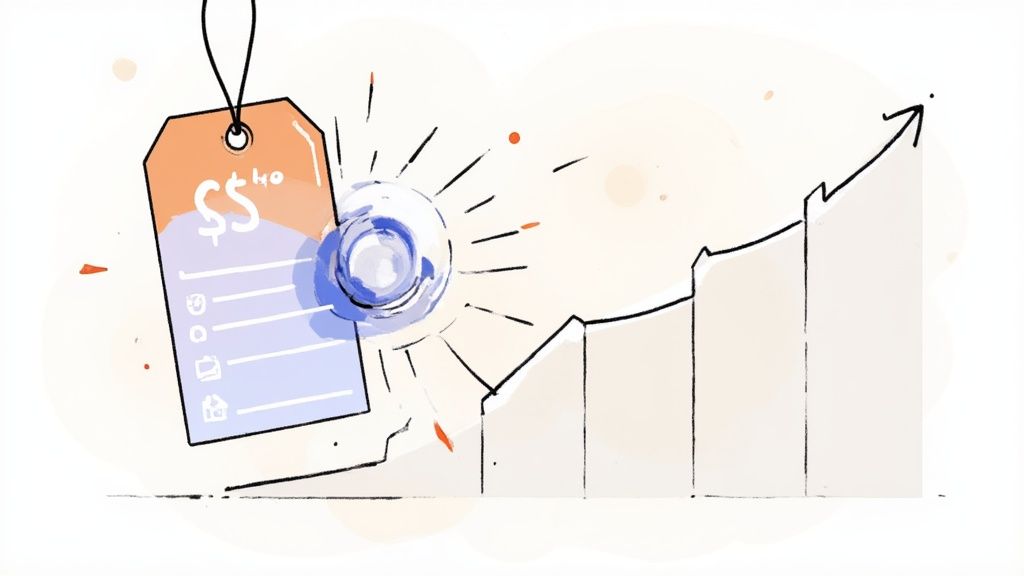
Your ecommerce store is a data factory, churning out mountains of information with every single click, search, and sale. But without the right tools, that data is just noise. AI analytics cuts through that noise like a master interpreter, turning overwhelmingly complex datasets into clear, strategic actions you can actually use to grow.
Instead of just reporting what happened, AI shows you why it happened and gives you a pretty good idea of what's coming next. This is one of the biggest benefits of AI in ecommerce; it helps you stop reacting to the market and start anticipating it.
Uncovering Hidden Patterns and Opportunities
Human analysts are fantastic at spotting the big, obvious trends. But AI’s machine learning algorithms can dig so much deeper, identifying subtle behavioral patterns and niche customer segments that are practically invisible to the naked eye.
For instance, an AI might discover a small but incredibly profitable group of customers who only buy specific products on weekday mornings. Armed with that knowledge, you can create hyper-targeted marketing campaigns that speak directly to them at the perfect time, making your ad spend far more efficient and boosting conversions.
AI doesn't just show you the numbers; it tells you a story about your customers. It connects the dots between browsing behavior, purchase history, and demographics to finally reveal the "why" behind every sale.
This is where the real optimization happens. When you understand your customers on this level, you can make smarter decisions across the board, from product development all the way to your marketing funnels.
From Reactive Decisions to Predictive Strategies
The true game-changer with AI analytics is its ability to predict the future. By crunching historical data and current trends, AI can forecast outcomes with startling accuracy. This lets you get ahead of market shifts before they even happen. For a deeper dive on this, check out our guide on predictive analytics for ecommerce.
This shift from reacting to predicting has a massive impact on your bottom line:
- Smarter Pricing: AI can model how a price change will impact demand for a certain product. This helps you find that sweet spot that maximizes revenue without killing your sales volume.
- Fraud Detection: By learning what a normal transaction looks like, AI can instantly flag any activity that deviates from the norm. This protects both your business and your customers from costly fraud.
- Optimized Marketing Spend: Predictive models can pinpoint which marketing channels are most likely to bring in high-value customers, so you can pour your budget where it will have the biggest impact.
Ultimately, AI analytics gives you the foresight to not just respond to the market, but to actively shape it to your advantage.
So, How Do You Actually Start Using AI in Your Store?
Knowing the benefits of AI is one thing, but actually weaving it into your e-commerce strategy can feel like a massive leap. The good news? It doesn't have to be. The best way forward is to start with a clear, specific problem you want to solve—not a complete, overnight overhaul.
First, identify your biggest headache. Are you bleeding sales from abandoned carts? Is managing inventory levels a constant, frustrating guessing game? Pinpointing a specific challenge like this gives you a clear target and ensures you're applying AI where it will make the most immediate, measurable difference.
Start Small, Scale Smartly
Once you’ve zeroed in on your problem, you can look for the right tools. You don't need a huge budget or an in-house team of data scientists to get your foot in the door. These days, powerful AI features are baked right into many of the e-commerce platforms and marketing tools you might already be using.
Think about these as low-risk, high-reward starting points:
- AI-Powered Product Descriptions: Use built-in tools to generate compelling, SEO-friendly copy for your products. This can save you dozens of hours of manual work.
- Basic AI Chatbots: Set up a simple chatbot on your site to handle common customer questions 24/7. It's an easy win that frees up your support team for more complex issues.
- Simple Workflow Automation: Use automation tools to tackle repetitive tasks, like tagging customers who haven't made a purchase in 90 days for a re-engagement campaign.
The key is to adopt a "crawl, walk, run" mentality. Kick things off with one tool, measure its impact on your chosen goal, and use those early wins to build momentum and justify expanding your AI toolkit.
Choosing Your Path Forward
As you get more comfortable, you'll find yourself at a fork in the road. One path is to go all-in with a single, unified platform where AI is deeply integrated across every function, from on-site search to marketing automation. This creates a seamless system but usually involves a bigger commitment.
The other option is to continue integrating specialized, best-in-class AI tools into your current tech stack. This à la carte approach gives you incredible flexibility, letting you pick and choose the perfect solutions for your unique business needs. Whichever direction you take, the golden rule is to scale based on proven results, making sure every new tool adds clear, undeniable value to your bottom line.
Got Questions About AI in Ecommerce? We Have Answers.
Running an ecommerce business means you’re always looking for the next edge. AI comes up a lot, but so do a lot of questions. Let's clear the air and tackle some of the most common things store owners ask about bringing AI into their world.
What’s the Real Payoff of Using AI in Ecommerce?
It all boils down to two things: smarter operations and a ridiculously personal customer experience, delivered at scale. On the front end, AI is the magic that helps you understand what your customers actually want. It shows them the perfect products at just the right moment, which is a direct line to better conversion rates and higher average order values.
But it’s not just about the customer-facing stuff. Behind the scenes, AI gets to work optimizing your inventory and keeping your supply chain humming. Think fewer costly stockouts and no more capital tied up in products that just won't sell. It's this one-two punch—a happier customer and a leaner business—that really gives you a serious competitive advantage.
How Much Is This Going to Cost Me?
That's the million-dollar question, right? The good news is, the answer isn't "a million dollars." The cost can vary wildly, but you absolutely don't need a massive budget to get your feet wet. In fact, many of the ecommerce platforms and marketing tools you're already using probably have powerful AI features built right in.
The smartest way to start is to think small. Find one specific, nagging problem—maybe it's the soul-crushing task of writing product descriptions or answering the same three customer questions a hundred times a day. Then, find an affordable, easy-to-use tool to fix it. This lets you see a clear return on your investment before you even think about scaling up.
Do I Need to Hire a Data Scientist?
Not anymore. A few years back, you might have. But the game has completely changed. We've seen a huge rise in genuinely user-friendly AI tools that have knocked down the technical barriers that used to keep smaller businesses out.
Today, you can get sophisticated AI up and running for things like:
- Customer Service: Setting up an AI chatbot often requires zero code. You're just telling it what to do in plain English.
- Content Creation: Tools out there can whip up ad copy and product descriptions from just a few simple prompts.
- Analytics: A lot of modern dashboards now use AI to automatically dig through your data and flag the important insights you might have missed.
The focus has shifted. It’s less about having in-house technical wizards and more about having a clear strategy. You just need to know what you want AI to do for your business.
Ready to put these benefits to work for your brand? The team of Shopify specialists at ECORN is here to help you integrate powerful AI solutions that drive real results. Explore our ecommerce solutions and start scaling smarter.






